Almogavers by Traveller
Desperta ferro!
Original SA post
Almogavers it is!
Almogavers
Desperta ferro!
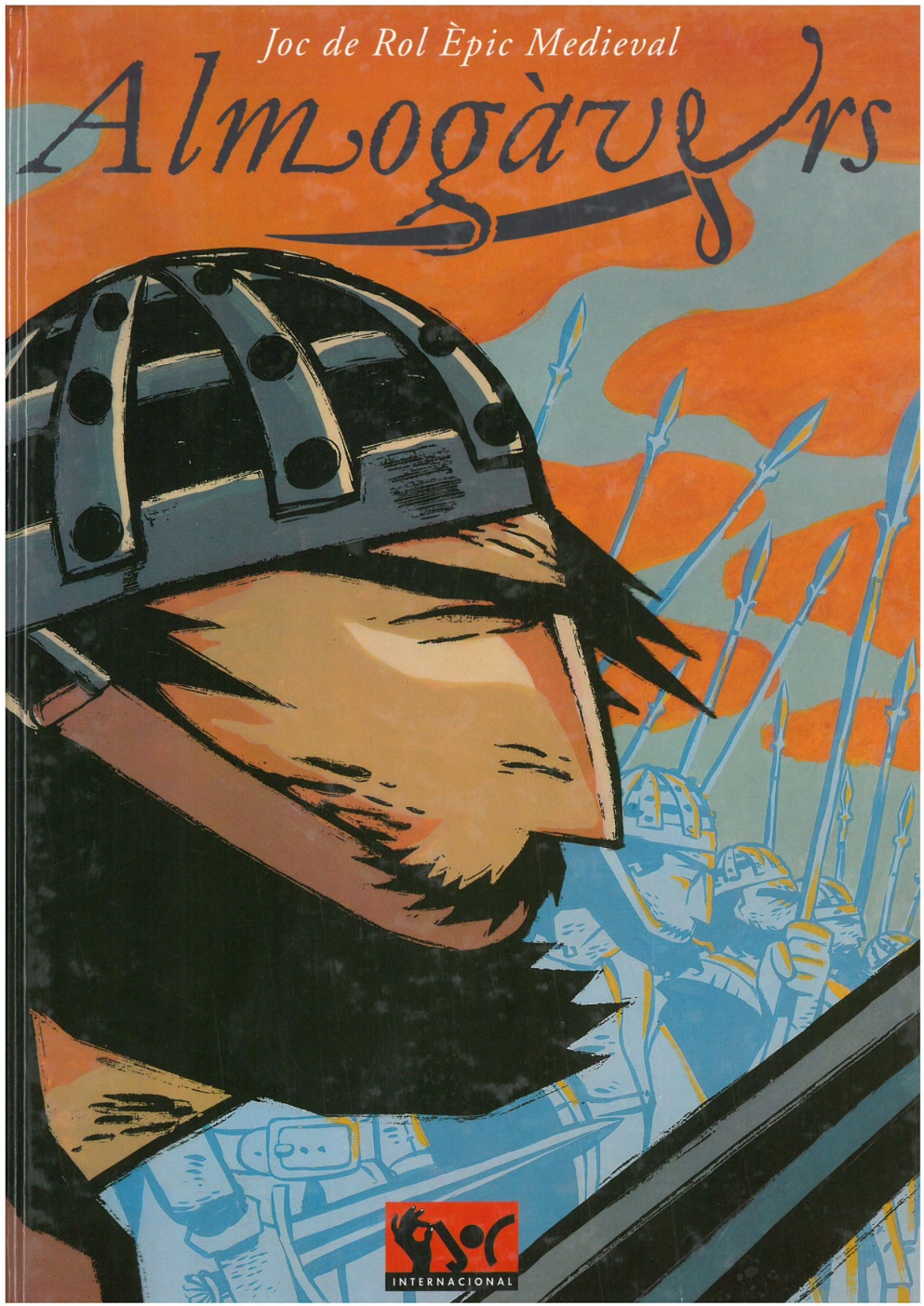
dig the sword hilt "e"
Almogavers is a 1995 "epic medieval" roleplaying game by Enric Grau and published by Joc Internacional. If you're familiar with Spanish games, you might notice the name of Ricard Ibáñez in the credits page: Ibáñez is the creator of
Aquelarre
, the seminal Spanish role playing game. Almogavers in freaking Catalan, which is close enough to Spanish that I can make it out with a dictionary and Wikipedia at hand. So what's it about?
Back cover posted:
"It is the year 1303. Our army heads to central Anatolia to face the Turks. The march is hard, but we believe in victory and our leaders. Such is our life, battle after battle, village after village, never stopping anywhere. We are... Almogàvers. "
The Almogavers were a type of mercenary shock trooper that served the Crown of Aragon and other kingdoms during the Middle Ages. The game focuses on the Catalan Company , a mercenary company that fought for the Byzantine Empire and others during the 14th Century. The book begins with a small introduction to role playing games (as all good games do), what PCs and NPCs and GMs and those funky dice are, and then drops us straight into the historical background of the game. Have a seat, it's going to take a while.
It starts in Sicily. After the death of Holy Roman Emperor Frederick II, the Papacy (a rival of Frederick's) grants right of conquest over Sicily, until then Germanic territory, to Charles of Anjou. By the year 1266, the island is in the French sphere of influence, and thus allied with the Papal State. The new King of Sicily is not well received by the Sicilians, though. All public posts are given to Frenchmen and the provincial capital is moved to Naples. In 1282, a revolt against the French takes place, the Sicilian Vespers , and Sicilian nobles offer the crown to Peter III of Aragon, who was married to Constance of Sicily and thus had a claim to Sicily. Peter invades the island, takes over as King, and from then on a long conflict between Sicilians/Catalans and French/Papacy forces takes place.
Peter dies in 1285 and leaves the Catalan-Aragonese crown to his eldest son, Alphonse, and the Sicilian crown to his second son James. But Alphonse dies an early death, forcing James to take over in Aragon and leave Peter's third son, Frederick, as regent in Sicily. With the international situation taking dire turns, James sees as the only way out to give up any claim to Sicily, but the people don't accept it and proclaim Frederick as their king. James can either accept the terms of the treaty he signed and help the French capture Sicily or support his own brother, and after reconsideration (which included the Pope trying to bribe him with sovereignty over Sardinia and Corsica) he leaves Sicily to its own devices. The Almogavers brought by Aragon to Sicily fight for Frederick against the French and the Pope, and it is here that one captain starts making a name for himself, former Templar Roger de Flor. By the year 1300, the fight is going well for Frederick, but general attrition and exhaustion makes all parties sue for peace at Caltabellotta. The Almogavers are suddenly out of a job, and led by Roger de Flor they leave Sicily for the Byzantine Empire: this is the beginning of the Catalan Company.
The following period is divided in three stages:
-
First era
: Emperor
Andronicus II Palaelogus
of Byzantium is in dire straits, with Turkish forces advancing from the East and Frankish remains of Crusader empires South and West. Byzantium's Alan and Turcopole mercenaries cannot hold... and that's where the Catalan Company steps in, with support of the King of Sicily (only too happy to get rid of mercenaries with far too much free time on his doorstep). Roger made some heavy demands of the Emperor, including marrying into the Imperial family and the title of Megaduke
 The Emperor agrees to everything, and in 1303 6,500 men make their way from Sicily to Constantinople. Everyone's happy except for the Genoese, until then the Empire's strongest allies. So while Roger is marrying himself a princess, Genoese and Catalan troops duke it out for the first time. The Emperor is quick to send his new, dangerous allies against the Ottomans, with their first victory being the liberation of Philadelphia (180 Almogaver casualties, over 18,000 Turkish dead - or so Catalan chroniclers claim
The Emperor agrees to everything, and in 1303 6,500 men make their way from Sicily to Constantinople. Everyone's happy except for the Genoese, until then the Empire's strongest allies. So while Roger is marrying himself a princess, Genoese and Catalan troops duke it out for the first time. The Emperor is quick to send his new, dangerous allies against the Ottomans, with their first victory being the liberation of Philadelphia (180 Almogaver casualties, over 18,000 Turkish dead - or so Catalan chroniclers claim
 ) With a string of victories and new reinforcements, Roger is acclaimed as a hero, and forces the Emperor to make him Ceasar and second on the line of succession, over his own son
Michael
- who soon begins plotting Roger's death. The commander is invited to a meeting at Adrianopolis, where he is murdered, and the Almogavers are purged from the Empire, with barely 3,000 men resisting in Gallipoli.
) With a string of victories and new reinforcements, Roger is acclaimed as a hero, and forces the Emperor to make him Ceasar and second on the line of succession, over his own son
Michael
- who soon begins plotting Roger's death. The commander is invited to a meeting at Adrianopolis, where he is murdered, and the Almogavers are purged from the Empire, with barely 3,000 men resisting in Gallipoli.
-
Second era
: Megaduke
Berenguer d'Entença
is the Company's new leader. He sends an embassy to Constantinople to sever any bonds to the Empire that betrayed them, but the Company envoys are killed by Michael. Berenguer is later captured by a Genoese captain, who inexplicably does not collect the bounty the Empire offers for him or the ransom offered by one of Berenguer's seconds,
Ramon Muntaner
. The remaining Almogavers led by
Bernat de Rocafort
go on a rampage through the Empire, raiding and pillaging everything they find along the way: their battlecry,
desperta ferro!
, goes down in history at this point.
The Company zeroes on Constantinople, and Michael gathers a formidable army of Alans, Turcopoles, Greeks and other mercenaries to stop them. The Almogavers' sheer posted:
posted:
Listen! listen! Wake up, O iron! / Help us God! / [...] / Just seeing us coming the villages are already ablaze. / Just seeing us passing the crows are wiping their beaks. / War and plunder, there are no greater pleasures. / Forward Almogavars! Let them call the gravediggers! / The voice of the Somatent is calling us to war. / Weariness, rains, snow and heat we shall endure. / And if sleep overtakes us, / we will use the earth as our bed. / And if we get hungry, we shall eat raw meat! / Wake up, O iron! Forward! / Fast as the lightning / let us fall over their camp! / Forward Almogavars! Let us go there to make flesh, / the wild beasts are hungry!
 sends the Byzantine army packing and Michael himself barely survives the battle. The Emperor desperately tries to negotiate a truce with the Almogavers while trying to get the Genoese to support him, but the Almogavers consider the lesson of blood learned and the Genoese dare not get involved. The Company scatters and spends the following years devastating Thrace, while a crack force is sent to Bulgaria to take out the material culprits of Roger's death, leaving Muntaner in Gallipoli with a few hundred men. Of course, the Byzantines and Genoese siege the city. Lacking men, Muntaner arms the city's women, and wisely waits until the enemy exhaust itself against the fortifications before sortieing and eliminating the Genoese commander. By 1306, Berenguer is finally released, but Rocafort refuses to relinquish command: while open civil war is avoided, the Company is fractured, with both sides taking over different headquarters. Due to a treaty with Sicily, Prince
Ferdinand of Majorca
arrives to take command of the Company, a move welcomed by everyone but Rocafort. The Company heads to Macedonia, but due to confusion - or treason - the vanguard of the army ends up fighting its rear guard and Berenguer dies, leaving Rocafort in charge of the Company, and eventually making Ferdinand and Muntaner part ways with him.
sends the Byzantine army packing and Michael himself barely survives the battle. The Emperor desperately tries to negotiate a truce with the Almogavers while trying to get the Genoese to support him, but the Almogavers consider the lesson of blood learned and the Genoese dare not get involved. The Company scatters and spends the following years devastating Thrace, while a crack force is sent to Bulgaria to take out the material culprits of Roger's death, leaving Muntaner in Gallipoli with a few hundred men. Of course, the Byzantines and Genoese siege the city. Lacking men, Muntaner arms the city's women, and wisely waits until the enemy exhaust itself against the fortifications before sortieing and eliminating the Genoese commander. By 1306, Berenguer is finally released, but Rocafort refuses to relinquish command: while open civil war is avoided, the Company is fractured, with both sides taking over different headquarters. Due to a treaty with Sicily, Prince
Ferdinand of Majorca
arrives to take command of the Company, a move welcomed by everyone but Rocafort. The Company heads to Macedonia, but due to confusion - or treason - the vanguard of the army ends up fighting its rear guard and Berenguer dies, leaving Rocafort in charge of the Company, and eventually making Ferdinand and Muntaner part ways with him.
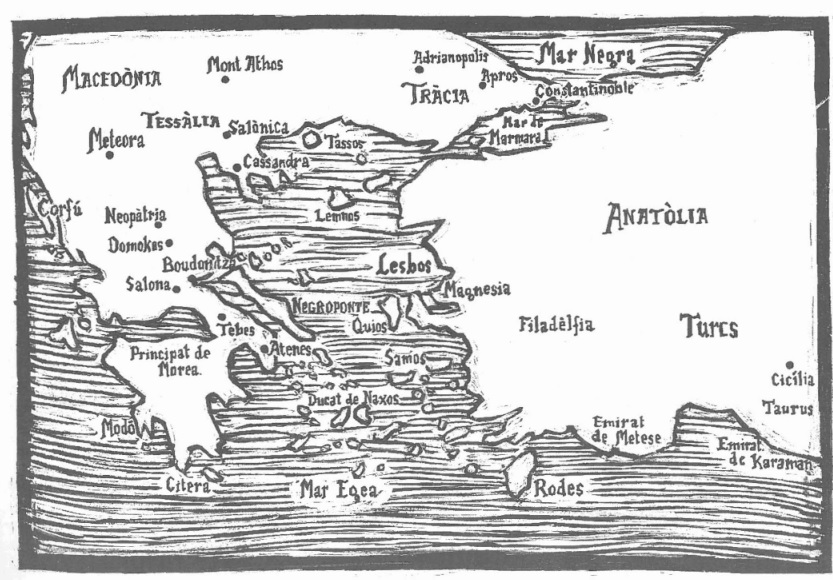
A little map to break up the wall of text
Rocafort's growing tyranny is seized by Thibaut of Chepoy , a servant of Charles of Valois, with whom Rocafort had signed a contract. Disgruntled Company leaders eventually relieve Rocafort from command and hand him over to Thibaut, who puts him at the mercy of an old enemy of his. The Company under Thibaut marches on the Duchy of Athens , an anarchic land nominally ruled by the dying Duke Guy II de la Roche. In 1310, Thibaut abandons the Company, fearing a sudden case of sword in the gut, and the enraged Almogavers turn on the leaders that had removed Rocafort from command. The Company becomes a military republic, ruled by a Council of Twelve and a quadrumvirate of two horse officers, a captain and an infantry Almogaver. A stepbrother of the now dead Duke, Walter of Brienne , hires the Company to clear the Duchy of his enemies, and pays two months' worth of wages in advance. The Company does its work too well, with over thirty castles falling to Walter in less than the two months he paid for, so he seeks to discharge the Company while keeping its best soldiers. Then he makes the mistake of threatening force if they don't comply. The following Battle of the Cephissus sees the end of French presence in Greece. With the Duchy under their control, the Company writes to Frederick of Sicily to make one of his sons claim it; Manfred of Sicily is chosen.
The following Battle of the Cephissus sees the end of French presence in Greece. With the Duchy under their control, the Company writes to Frederick of Sicily to make one of his sons claim it; Manfred of Sicily is chosen.
-
Third era
: by the year 1318, the Almogavers extend their territories, founding the
Duchy of Neopatria
. Both duchies are ruled by Catalan feudal law. In 1357 Frederick III of Sicily gives away his rights over the duchies to his sister Eleanor and, by virtue of her marriage to
Peter IV
, to the Aragonian crown. In 1380 Peter IV becomes the direct ruler of the Company territories, but it would be short-lived: the Duchy of Athens is occupied in 1388 by the lord of Corinth, and in 1390 Neopatria suffers a similar fate.
The tl;dr of it:
the Wiki, unsourced but I buy it posted:
In the regions of Attica and Boeotia, a popular saying included: may the revenge of the Catalans fall on you. In Bulgaria, the expressions "Catalan" and "Son of Catalan" mean "wicked man, soulless, torturer". This negative connotation reached beyond the boundaries of folklore to influence poets such as Ivan M. Vazov in the poem Pirates, first published in 1915. Vazov includes the Catalans with the Turks as the greatest oppressors of the Bulgarian nation. In the region of Parnassus, the following saying is popularised: "I will flee from the Turks to fall into the hands of the Catalans".
Currently, in Albania the word "Catalan" means "ugly and wicked man." Likewise, "Catalan" or "Katallani" is designated in Albanian folklore as a monster with one eye, reminiscent in many ways the Cyclops Polyphemus. This cyclops is represented by a wild blacksmith who feeds on human flesh. He also has no knees, so he can not bend, and long legs like masts of a ship. He faces a young hero named Dedaliya. This tradition, in various versions, is usually called by the title of Daedalus dhe Katallani , Daedalus and Catalan.
Next: on a roll of 96+, you're Jewish.
But no ratcatchers, goddamn
Original SA post AlmogaversBut no ratcatchers, goddamn
It's on to character creation! We get a description of the character sheet, which is nice, then we are told how characters are defined by their stats and attributes . The stats are further divided in passive, active, physical and mental, with a total of six stats: Constitution (passive physical), Willpower (passive mental), Agility (active physical), Dexterity (active physical), Memory (active mental) and Perception (active mental). To generate these stats, roll 3d6, rerolling any dice that roll 1, and add the dice for a range of 6-18. The player chooses which stat gets the roll, but once a stat has a value fixed to it the player can't use another roll for it - except for the very last extra roll done after all the stats are rolled, which can be used to replace any stat at the player's choice. Attributes are also rolled in a similar way, but they use a different five-rank scale: Very Low, Low, Normal, High and Very High. There's a table for reference. The attributes are Strength , Size , Appearance and Charisma. Around 40% of people have Normal attributes, 20% are Low or High and 10% are Very Low or Very High.
Then the player notes down the character's initiative modifier , which is influenced by Agility, encumbrance and the armor they are wearing. As well, they note the character's damage modifier which is provided by the Strength attribute, and their damage capacity (hit points) that depends on their Size and Constitution. Damage capacity comes in three types: A (capacity/2 +2), B (capacity) and C (capacity*1.5) An average character has a damage capacity of 12 and a damage mod of 2d6, but I can't tell how bad (or good
 ) this is until I get to the combat chapter. The character's height and weight are given by their Size and damage capacity, with a little wiggle room for players to adjust - a Normal Size man is 1.65 m, for instance, and can raise or lower that in 10 cm. Characters also have
Prestige
, which begins at 0 and represents what others think of them. A high Prestige is necessary for certain positions, like army commander!
) this is until I get to the combat chapter. The character's height and weight are given by their Size and damage capacity, with a little wiggle room for players to adjust - a Normal Size man is 1.65 m, for instance, and can raise or lower that in 10 cm. Characters also have
Prestige
, which begins at 0 and represents what others think of them. A high Prestige is necessary for certain positions, like army commander!
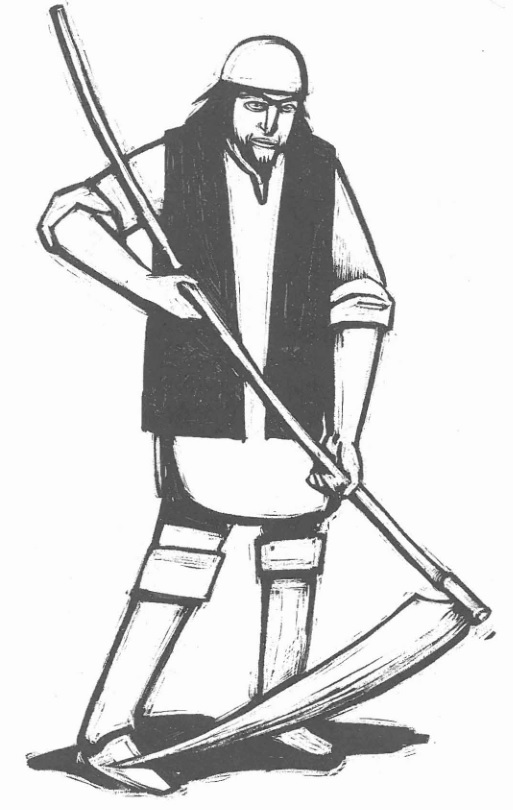
Bon cop de falç, bitch.
Now it gets interesting. First, the player can roll for (or straight up choose) the character's Origin . The options are:
-
Catalan
: of course. You're a Catalan on a roll of 1-50, because dammit you're in the Catalan Company. The character can be a line Almogaver, or a trader, knight, sage, etc.
-
Greek
: this character for some reason has joined the Almogavers or has a good relationship with them. The Greeks weren't particularly close to the Almogavers to begin with, but there were always exceptions.
-
French
: this would be odd, as the French and Catalans were embroiled in the conflict over Sicily. This character is going to be a traitor to the French, an emissary for some French noble, or another similar reason to be agreed between player and GM.
-
Turkish
: the Almogaver army had a group of Turkish mercenaries. This character could also be a trader, medic, or some other suitable profession working with the Almogavers for profit.
-
Alans
: the Byzantine Army had a mercenary force of Alans from Thrace. They had a certain rivalry with the Almogavers, and some hated them enough that they would plan their operations separate from them so that they wouldn't have to march together, while some others happily served under Roger's command. This character is going to be a mercenary or some other similar profession.
-
Arab
: these characters are going to come from Iberian Arab families, fully integrated with the Almogavers.
-
Venetian
: the other trade power of the era along with the Catalan and the Genoese. It would make sense for Venetians to be foes, but due to their trade war with the Genoese they had a good relationship with the Catalans and were sometimes even allies (as long as they were against the Genoese)
-
Genoese
: speaking of which! This would be an even stranger ally, because even though they were allies of the Byzantines, they hated the Almogavers to death. Then again, there might not be better place for a traitor to their people than among their own worst enemy.
-
Jewish
: highly important in Middle Ages economy due to religious restrictions on interest lending. A Jewish character could be a moneylender, of course, but also a craftsman, soldier or peasant (as long as they were allowed to in the country they are, that is)
The next step is finding out their Social Class. These can be chosen by the player from Soldier, Burgher or Peasant, or rolled on the table. Only one roll and the result stands, but the player can potentially roll into the nobility! The social classes are:
-
High Noble
: barons, counts and the like. The game assumes that a High Noble PC is the heir to one of these nobles, and has access to servants, soldiers under them, and so on.
-
Low Noble:
: a noble of lesser rank. The PC could also be the nth child of some bigger noble. They don't get stuff as good as High Nobles, but they're still nobles. The character can trade their status for Burgher to represent a particularly wealthy burgher, or for Soldier and get the position of
Adalid
(captain, roughly) in compensation. In both cases, they still purchase gear as a Low Noble.
-
Soldier
: men at arms, mercenaries, and other punchy/stabby dudes.
-
Burgher
: from the wealthy trader or guildmaster to the peddler or small craftsman.
-
Peasant
: farm laborer, shepherd and the like.
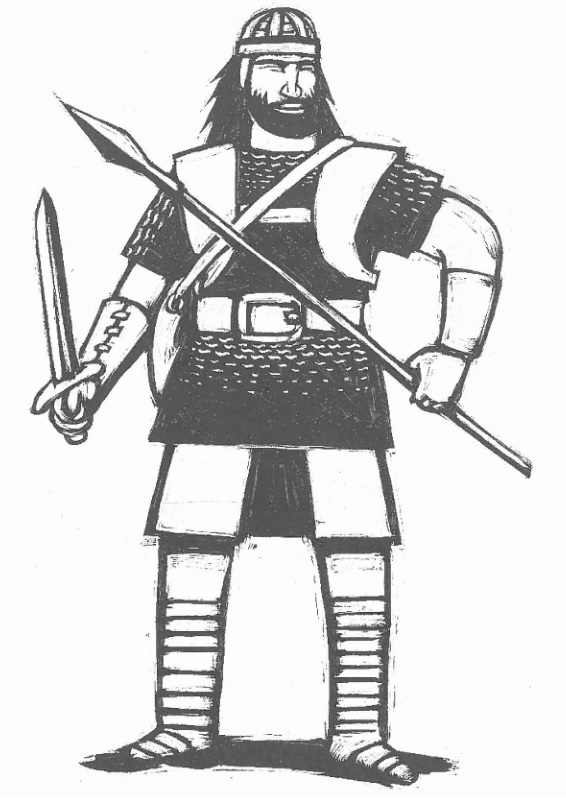
Swole and stabby.
The table restricts some classes depending on the character's Origin: for instance, Jewish characters cannot be nobles because, well, they're Jewish. As Greece is the focal point of the setting, only Catalan, Greek and Jewish characters can be Peasants, as verisimilitude is broken otherwise (how would peasants from other lands even get there? Nevermind that most line Almogavers were Catalan peasants and got there by ship...). Turkish and Arab nobles are also not a possibility as most people of those nationalities in Greece are traders or soldiers. Sure, whatever.
Then, the character chooses their Profession . No roll here, just pick up whatever, but the character's social class and origin restricts some choices.
-
Almogaver
: seasoned warrior, proud of being part of the Company, of barbaric aspect but highly disciplined. Their hierarchy is democratic and promotions are by combat merit. Most are Catalan, of course, with some recruited from the places the Company travels through. Requires Soldier (or Peasant, if the character is Catalan)
-
Craftsman
: the Company did not bring craftsmen along, they just bought or sourced what they needed along the way. They might have recruited some from time to time, but they would have to know how to defend themselves. The exact type of craftsman (blacksmith, weaver, etc.) has to be determined here, and we are told all craftsmen at this point in history were members of a guild, "with all the good and bad that it implies." Requires Burgher or Peasant.
-
Bandit
: the easiest Profession for the warrior out of a job
 The Company gives a job to those that can fight, so it's not too farfetched to find a former bandit among their ranks. Requires Noble (someone who lost their fortune, maybe?), Soldier or Peasant.
The Company gives a job to those that can fight, so it's not too farfetched to find a former bandit among their ranks. Requires Noble (someone who lost their fortune, maybe?), Soldier or Peasant.
-
Hunter
: only nobles had the right to hunt in the Middle Ages. The exact nature of the hunter depends on their social class: if they're Noble, they're a noble with hunting as their favorite sport; if they're a Soldier, then they are huntsmen in the service of a noble; if they're a Peasant, they're a poacher.
-
Knight
: all officers in a medieval army were knights. The position of adalid is considered to be equivalent (but in real life adalids and knights were different things) and this is what a Low Noble that trades in their status and becomes a Soldier ends up with. This Profession also includes those that fought under Roger de Flor (first Era) in cavalry units. Noble only.
-
Cleric
: it's perfectly justifiable to have clerics serving in the Almogaver army, but they would have to be of humble origins. If they're of high social class, they could be confessors to some noble or members of the Church of Constantinople that follow the army for some reason, or missionaries as well. Monks make more sense in the third era. Requires Noble, Burgher or Peasant.
-
Trader
: Catalan traders followed the Almogavers. There were also Venetian and Genoese traders, though of course the latter were a very rare sight among Almogavers. Requires Burgher (or Noble if the character is Venetian or Genoese)
-
Courtesan
: an Almogaver courtesan would be hard to imagine, but then again there was Roger de Flor. They're easier to picture in the third era. Normally, they'll be Greek (first era) or French (second era) characters that follow the army representing the Imperial court or some important noble. Requires Noble.
-
Warrior
: similar to Almogavers or Mercenaries, but this Profession represents the fighter that isn't just raised for one campaign or period of time, but serves under a lord for life. Obviously they need a lord (knight or noble) to serve under, and thus may end up fighting alongside the Almogavers. Requires Soldier.
-
Laborer
: the most common Profession in the Middle Ages, "but here it's not logical that they continue to be laborers." Perhaps the character
was
a laborer, and joined the army as a slave, servant, or soldier. Requires Peasant.
-
Thief
: this Profession is urban in nature, and thus the character needs to hail from one of the cities of the age (if it's Constantinople, the better) The game assumes the presence of a formal Thieves' Guild, a Greek "mob" with contacts among Venetians, Genoese, Catalans, Turks and other Muslim peoples. A Thief character passes themselves as another Profession, which is the one actually written on the character sheet for all to see. Other players may not know they are a Thief, it's just a secret between player and GM! This is also a good choice for spies. Requires Soldier or Burgher.
-
Minstrel
: minstrels in the Middle Ages go from town to town and city to city, frequently visiting the courts of the places they pass by. It would be strange, but not unthinkable, for one of them to follow an army. Requires Noble, Burgher or Peasant.
-
Mercenary
: equivalent to Almogaver, with the difference that this character is not part of the Catalan Company itself. Requires Soldier.
-
Medic
: this may represent the stereotypical field medic that serves as surgeon and barber. They're supposed to be studied folk. Pay is low, but they can go anywhere (to treat diseases, honest!) and thus make good spies. Requires Burgher.
-
Shepherd
: see Laborer. This character is easier to justify, as they can be a tracker or guide. Requires Peasant.
-
Moneylender
: the stereotypical Jewish Profession. Very hard to find a reason for them marching along with an army, and they need to be based in a city. Easier to justify in the third era, when adventures are not as linked to army life. Requires Jewish Burgher.
-
Sage
: this can be a scribe, advocate, notary, professor, alchemist... The exact type must be determined at this point. Sages may follow the army out of fidelity to a noble they advise and serve. The GM and player should reach an agreement over the reason why they are here. Alchemist Sages or Mage Sages that want a level of Initiate or superior in Magic should have played a solo adventure before the game (wait, magic?
 ) Requires Burgher.
) Requires Burgher.
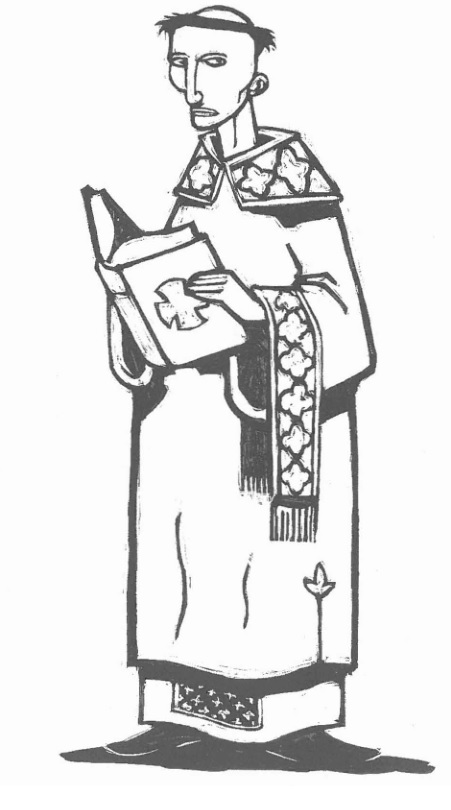
gyahahahaha look at his face
Now it's time for Skills , Knowledges and Combat Techniques! Skills are physical abilities, relying on Dexterity and Agility; Knowledges are the things the character knows, and they are influenced by Memory and Perception; and Combat Techniques, which are defined in the Combat chapter (still relying on Dexterity and Agility, mind you). Abilities are rated in six Experience Levels : Ignorant , Neophyte , Apprentice , Initiate , Master and Grand Master . To buy them, the character needs Experience Points , which are at first dictated by their starting age. The game says that the older the character is the more XP they get, but they also begin losing stat points! We'll only bother with the XP for now, and we are recommended to use 27 years (180 points) as a baseline. Characters also get a number of free abilities based on their Profession, which also restricts buying some of them - try justifying why your Laborer knows Alchemy, for instance. No, seriously, try it, maybe the GM will let you do it. Or not! Characters also get starting languages depending on their origin: their native language starts at Initiate level and everyone gets Catalan at Apprentice level (Catalan characters get Greek instead), so everyone can talk with each other. The exact cost of raising a skill, knowledge or technique varies depending on its ruling stat, and it bears noting that there are sublevels as well starting from Neophyte, so a character needs to go through Neophyte-, Neophyte and Neophyte+ before they can become Apprentices. Spare XP can be banked for later use. Stats also limit the maximum level of an ability, with a minimum of 16 in a stat to reach Grand Master+.
We also get rules for getting old at this point. For every year over 35 the character has, make a Constitution roll with a difficulty of (Age-35)/5, round down. Failing this roll means losing one physical stat point, player's choice, and a disastrous failure means losing two points. Beyond 50 years old, the player may choose mental stats. Attributes may also be reduced, but they only ever go down one level.
Then it's on to money, gear and possessions! Whew, this has taken a while. For simplicity reasons, the game uses silver and gold coins: one gold = 20 silver. Characters roll 3d6 and reference a table: of course, nobles get more munneh, peasants get zilch. Possessions are determined next. Characters get a number of points to buy possessions that are determined by their social class (again, nobles get more) and they can then buy anything from weapons and armor to land and castles, if their class permits. Some assets they can buy come with an upkeep cost, while others actually make money for their owner. Characters must pay 1% of the total value of their lands and stuff in taxes at the end of the year, or lose 10% of their possessions. Spare points from this stage can be converted to silver coins at a 1:1 ratio. Finally, there is a gear list, with items rated as Common, Infrequent, Rare and Exotic: starting characters can only purchase Common and Infrequent items. In play, traders may sell stuff for 1d4 times their list price, so be wary!
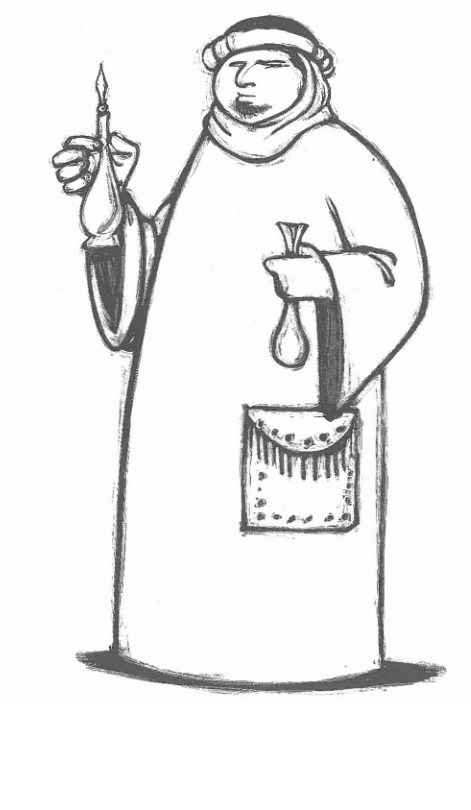
Fat Bro wouldn't rip us off with his potions, would he?
To finish, there is an optional Personal History section. You can roll for your day and month of birth, and that can make you a Lucky or Unlucky person. Lucky characters get to reroll one roll per adventure, while Unlucky characters get one of their rolls per adventure rerolled by the GM. Characters can also get Destiny Points (Age-16) and use them to purchase positive, negative or neutral Events. Buying positive events must be balanced by buying negative events of the same value. Any Destiny Points not used at the end of this step are lost. Positive events can be stuff like Being Happily Married (+Charisma) or Killed An Enemy Leader In Combat (+1 Prestige), negative events can be things like Was Stuck In A Tiny Place As A Child (claustrophobia!) or Swore Fidelity To The Genoese (
 ), and neutral events can be things like Having Siblings or Having A Dead Child (hey, no stat reductions or anything
), and neutral events can be things like Having Siblings or Having A Dead Child (hey, no stat reductions or anything
 )
)
Characters gain XP by getting older (they get the points they would've gotten according to the table for every year they live) and by surviving adventures, which give them 2-8 points depending on the adventure's length. Characters may also train their abilities with teachers, who should have the ability at a greater level than them. The XP spent in an ability trained with a teacher are multiplied depending on the difference of level between teacher and student (a teacher with just one level above their student makes one XP worth 1.5 points, while one with three levels above them makes one XP worth 2.5 points!) Training takes one week, and the teacher's wages of course.
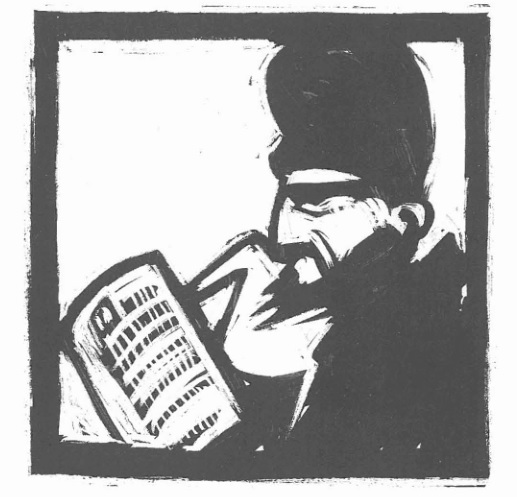
I don't know what Beard Sage is reading here, but it doesn't look good. Probably some French shit

Next: d20s and Resistance Tables, oh my!
A table for you, a table for me
Original SA post AlmogaversA table for you, a table for me
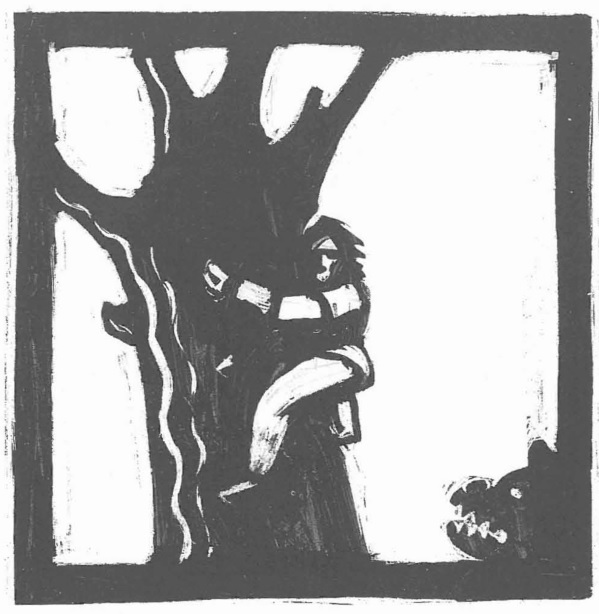
 but still
but still
A short update this time. Let's see how the game system works. It's based around an Universal Table in which you roll a d20, use the result to locate a row, then note the level of the relevant skill, knowledge or technique to find the final result. Rolls can be Disastrous (shit doesn't work and you fuck up even further), Failures (shit doesn't work), Normal Success (shit works), Special Success (shit works pretty good) and Critical Success (pro shit working right here) As we can see, low rolls are better.
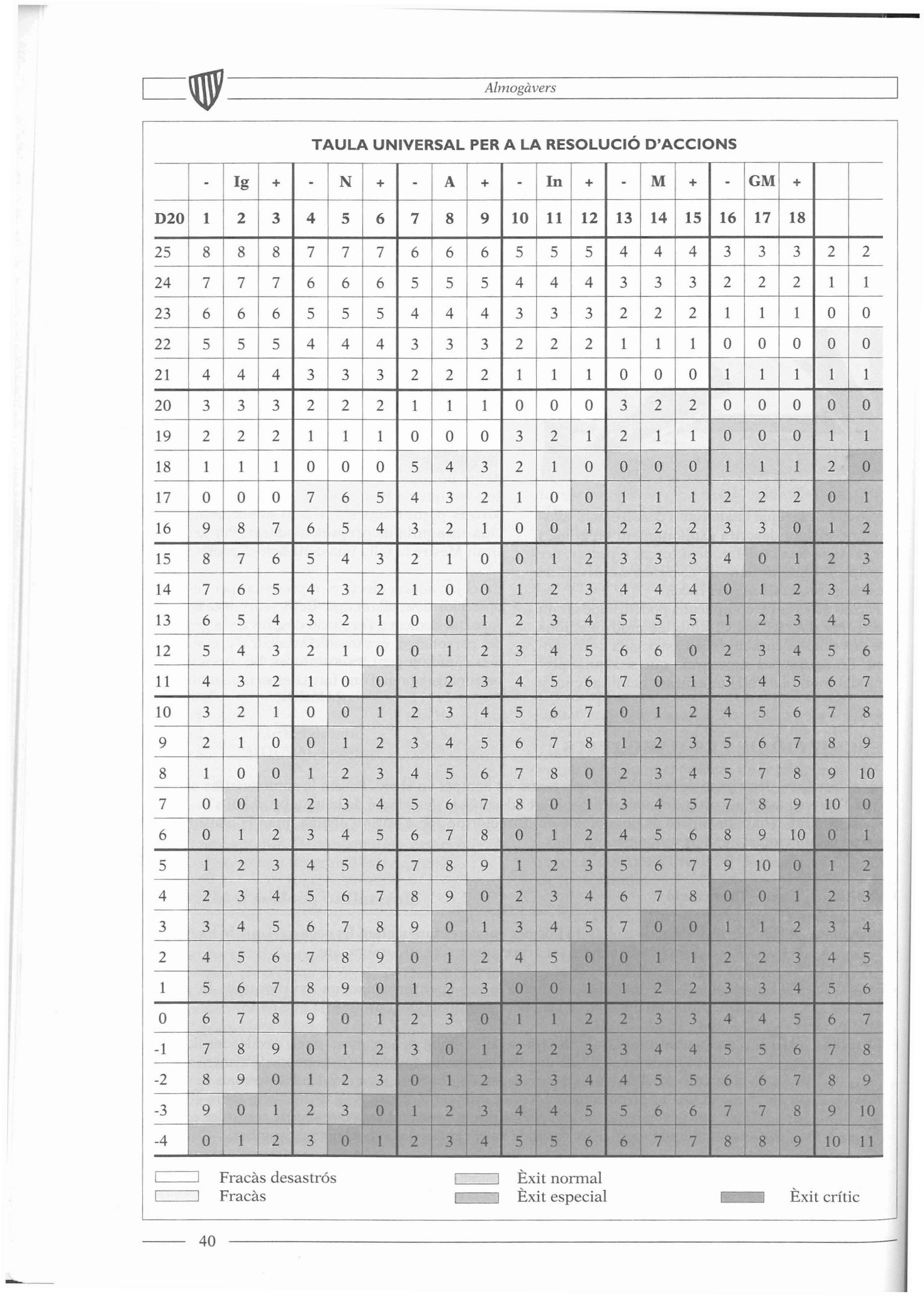
Table!
 posted:
posted:
Paulos Posjoros, cleric, tries to convince his flock that hanging around with "harbor women" is a sin. He rolls his Eloquency skill that he has at Initiate level and rolls a 5. According to the table that is a special success. Paulos smiles seeing the faces of his audience and thinks that the prostitutes from the docks will finally lower their prices and he will be able to afford them.
The table also shows Margin of Success for rolls, that number in the cell you roll, which is mostly used to tell the difference in success (or failure, depending) for two performances of the same action. Some actions can have a difficulty modifier , which is a straight modifier to the d20 roll. Stats and attributes can also modify rolls, but the game advises not applying these modifiers unless the roll is particularly important. The GM can potentially demand a certain MoS if the situation calls for it, like if you're trying to sculpt a masterpiece a simple success isn't going to cut it, but it's better to calculate difficulties first thinking just of the normal success as the benchmark.
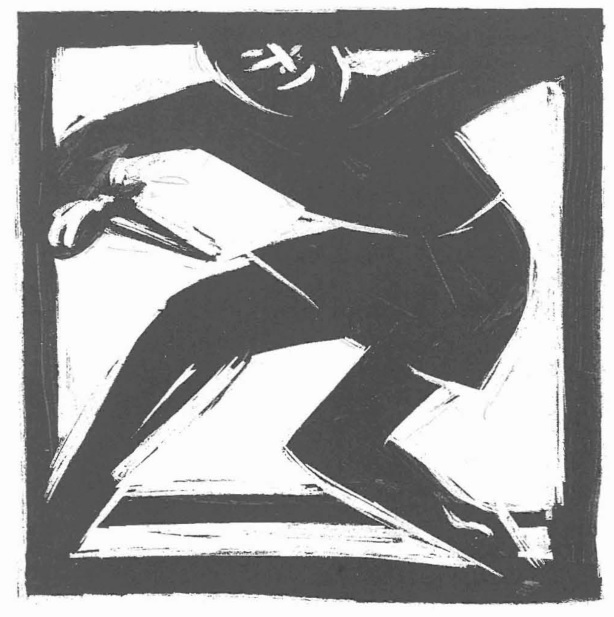
Fucking Catalan ninja!
This is the system used for unopposed rolls. For contested rolls , the superior success type (or MoS if they have the same type of success) wins. These rolls may be repeated several times depending on the nature of the contest, two guys armwrestling would be pushing each other's arms closer to the table or away from it with each roll for instance. If a stat roll is called because there's no applicable ability, in which case we have several options: roll under the stat with a d20, AD&D style; roll using the table (that's why that 1-18 row is for); or simply roll as if the character had a relevant skill at Apprentice level, further modified by the stat in question - this is used for stuff that isn't explicitly described in the game and doesn't come up often, like say fishing or underwater basket weaving. There's also a table for quick NPC skill level generation, which doesn't include Grand Master level because that requires special dedication or being thrown into ~*intense situations*~ once a week like PCs usually end up.

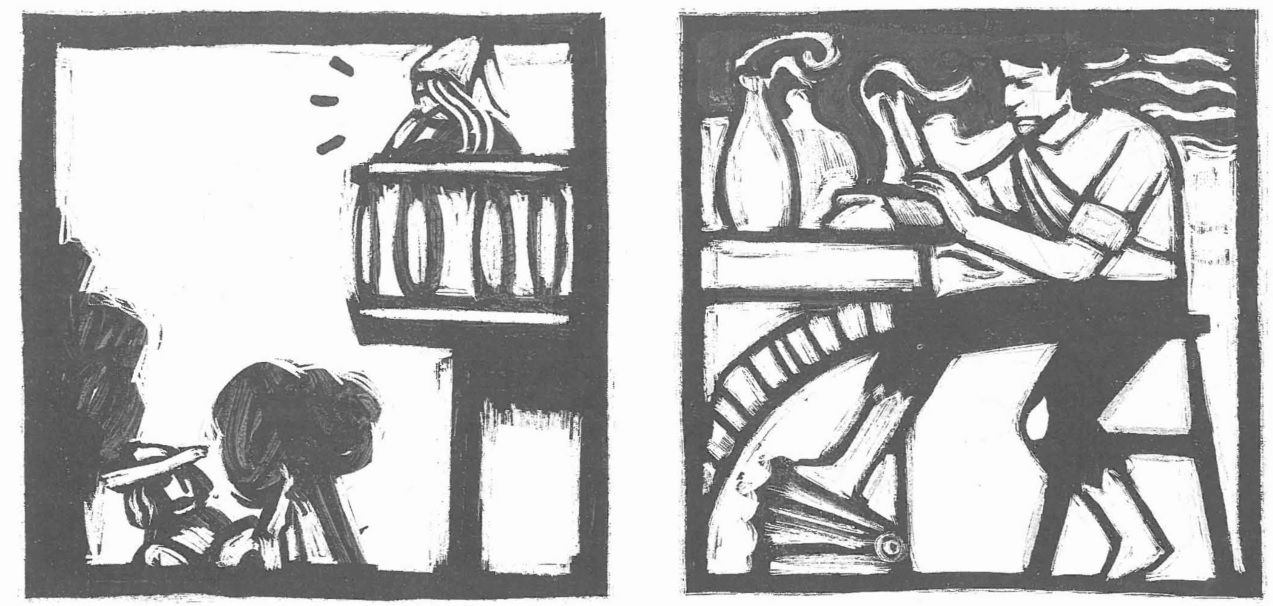
Left: a good target for your Throw Boot skill. Right: Walter White In The 14th Century.
Then it's on to skill descriptions ! I'm not going to bore you with every single one of them, you'll have an idea of what's in here if you've ever played or read a low fantasy or historical game, but I'll just point out some of the more interesting details. The Craft skill at Apprentice level implies having a Master, and further levels mean the character is involved with the relevant guild's hierarchy. Seduction only works in members of the opposite sex and requires two successful rolls (first impression, then a roleplayed schtupping up, then another roll modified by the GM's opinion of the schtupping) before kissing and groping can take place
 Alchemy comprises both real world chemistry and fantastic alchemy with elements sourced from magical creatures and the like (magic?) and it requires Calculus because hey, you don't want to add any more cow dung than you have to. Also, the GM is encouraged to make shit explode in the PCs faces if the players get cocky and start cooking themselves batches of
FOOF
or whatever. Astrology also requires Calculus because those astral charts are some hard shit. Calculus itself needs Initiate or Master level to be useful to the previous two skills, but lesser levels are enough for traders and money people. Read/Write is a separate knowledge from speaking, but knowing how to read/write a language at least grants you Neophyte in speaking ability. Magic, like Craft, implies the presence of a master and joining a magical order (magic?)
Alchemy comprises both real world chemistry and fantastic alchemy with elements sourced from magical creatures and the like (magic?) and it requires Calculus because hey, you don't want to add any more cow dung than you have to. Also, the GM is encouraged to make shit explode in the PCs faces if the players get cocky and start cooking themselves batches of
FOOF
or whatever. Astrology also requires Calculus because those astral charts are some hard shit. Calculus itself needs Initiate or Master level to be useful to the previous two skills, but lesser levels are enough for traders and money people. Read/Write is a separate knowledge from speaking, but knowing how to read/write a language at least grants you Neophyte in speaking ability. Magic, like Craft, implies the presence of a master and joining a magical order (magic?)
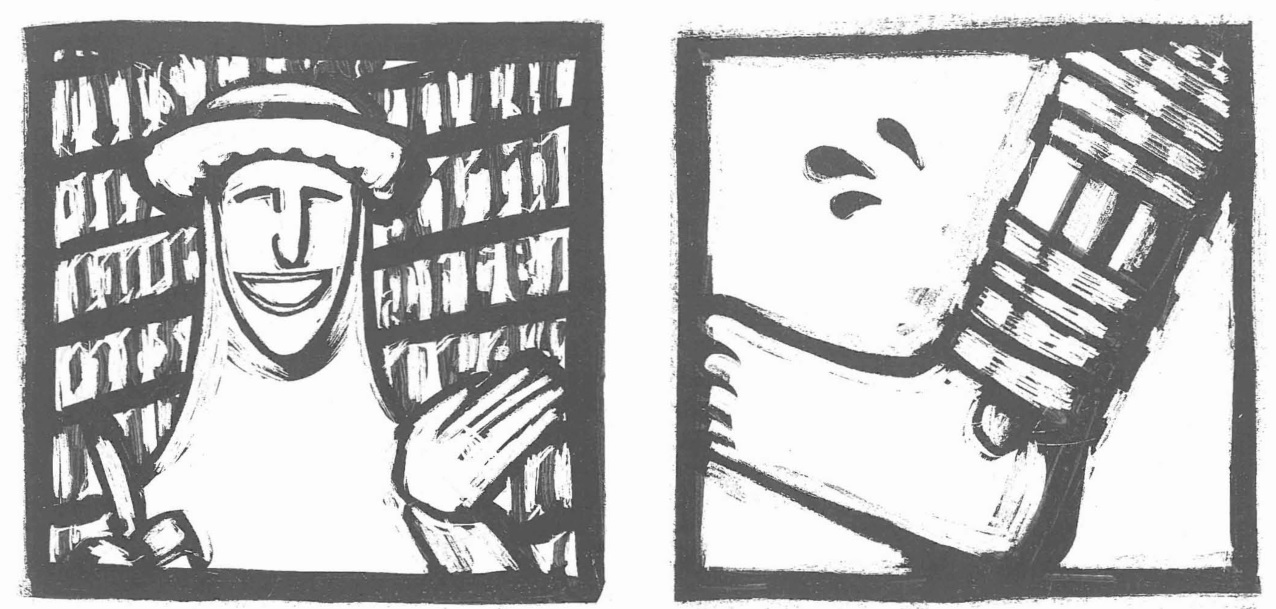
Dude is entirely too happy over your twisted ankle.
Next: the Most Noble And Ancient Catalan Art Of Clobbering.
Stabbing dudes in the dong since 1300 REPRESENT
Original SA post
Thread moves fast!
Almogavers
Stabbing dudes in the dong since 1300 REPRESENT
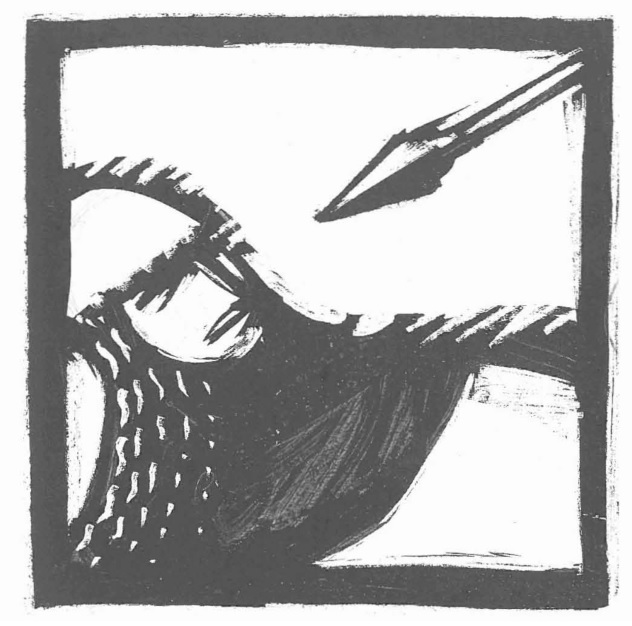
AW SHIT
Alright, let's get down to
combat.
The rules assume the use of miniatures and terrain to represent combat situations, but it doesn't push them as hard as, say, WFRP 1E. There are a couple of detailed explanations on what "combat time" (initiative) and
combat round
are, and it reads as if the game assumes players aren't just unfamiliar with RPGs, but the entire idea of turn-based gaming. So we're told that, for instance, while some actions like "I grab the book and start reading it" happen as fast as declaring them, during combat everything goes slow-motion, as it takes minutes for players to declare things their characters do in a few seconds. I mean, yeah, it's right, but I don't think I've ever seen RPG combat described like that.
Anyway,
actions!
They are divided in
long
(lasting over 2 seconds, an elaborate movement or sequence of movements),
short
(1-2 seconds, a simple movement) or
complementary
(barely take time, done at the same time as other actions).
-
Long
-
Acrobatics
-
Load a Crossbow
-
Switch Weapon
-
Run (move up to 5 times the miniature's height)
Short
-
Attack with Hand Weapon
-
Nock an Arrow
-
Attack Barehanded
-
Long Movement (up to the miniature's height)
-
Fire a Bow
-
Jump
Complementary
-
Short Movement (up to half the miniature's height)
-
Fire a Crossbow
-
Dodge
-
Parry with Weapon
-
Block with Hands
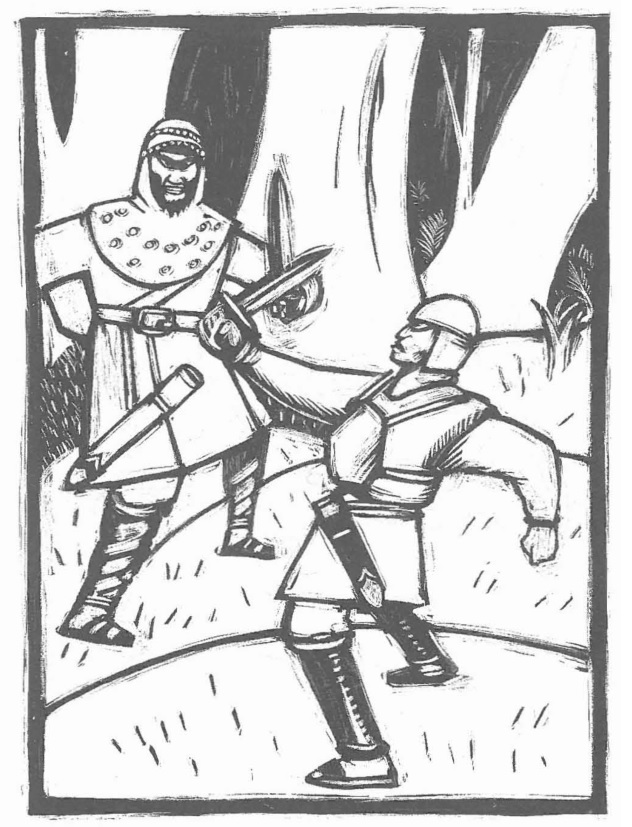
Oh no you don't, you literal neckbeard
During a combat round, a character may perform 1 long action and 1 complementary action, 2 short actions and 1 complementary action, or 1 short action and 2 complementary actions. Actions are declared in reverse Agility order, so that faster characters can see slower actions coming. Players only have one or two seconds to think before declaring, because there's so little time to think during combat: the GM should have the actions of slower NPC considered beforehand so that PCs have something to react to. Apparently, the weapon used, the character's Agility and the difficulty of getting an action done faster modify the action's initiative rank.
After actions are declared, they take place. Short actions go first, then long actions; complementary actions go when they're needed (parries happen when the character is attacked) or when the character wishes (short movement, for instance) Within short and long actions, they're ordered by the character's Agility and their modifiers for armor and weight. If two actions are simultaneous but one is a ranged attack and the other a melee attack, the latter goes first. Since, as we will see later, an action may be hastened or not, in order to prevent conflict between GM and players the game suggests that the GM declares all the NPCs' actions first and let the PCs act according to them. Of course, a character cannot be touched by a weapon if they're outside its range, and interestingly if two weapons clash they roll damage, and if one rolls twice as much as the other the loser is sent flying away.
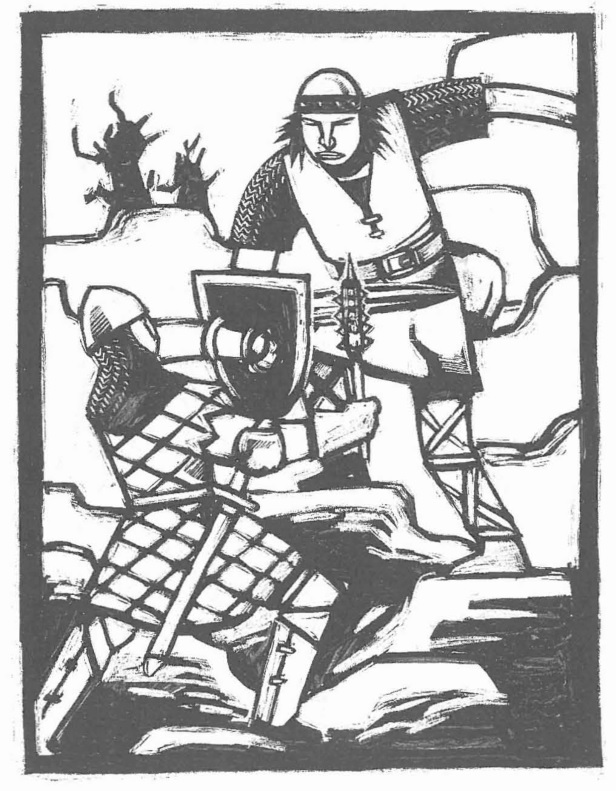
"My arm is fucked? Well, the axe it is wielding will make you just as fucked."
So, combat rolls! They're opposed rolls using the rules we saw earlier with the Universal Table.
-
If attacker and defender
attack at the same time
, both roll on the table: if one gets a better success type, both successes are reduced until only the better success remains (so if A gets a Special Success and B gets a Simple Success, A hits with a Simple Success). If they both get the same success, the weapons clash.
-
If
one attacks and the other parries/blocks
(the most common case) then the defender wins if they get the same degree of success or better; if the attacker gets the higher degree of success, then both rolls are reduced until the loser fails, just like the first case. The same attack cannot be parried twice. Shield blocks are easier to make (-3 difficulty), but the shield can take some damage. Successful weapon parries make the weapons clash.
-
If
one attacks and the other dodges
, the rules are the same as the previous case except that there's no weapon clash or shield damage to consider.
-
If
one attacks and the other moves
, the attack is an unilateral action made more difficult by the type of movement being made by the target: Very Hard if they're running, jumping or performing acrobatics, Hard if they do anything else.
-
If
(any other case)
, it's the GM's call.
Damage is calculating by referencing the weapon's base damage (each weapon has a base damage score for each of the three degrees of success) then adding the Strength modifier. As an optional rule, an additional difficulty modifier equivalent to (attacker's initiative mod - defender's initiative mod) can be applied to attacks. Actions can be hastened by adding a +3 difficulty modifier to reduce the initiative mod in -1, or delayed in +1 to get a -3 difficulty modifier, but no action can go earlier than initiative mod 0. A character can also increase the damage they deal on a successful blow by adding +3 to the difficulty per +1d6 they want to add.
Wounds are classified as Light , Normal , Severe and Grave . Damage up to Damage Capacity A is light, up to Damage Capacity B is normal, up to Damage Capacity C is Severe and anything worse than that is Grave. Once damage is dealt, the specific wound is located on the character's body depending on the attack's location: each weapon can deal one or more of high , medium or low blows that can affect different parts of the body, and some weapons can deal general attacks with chances to damage any part of the body. Armor reduces the damage, and if the wound is Severe or worse a d20 is rolled on one of the three damage tables ( Slashing , Bashing or Piercing ) to know the exact organ, muscle or bone that took the hit. I know this sounds like Historical Medieval Phoenix Command, but it's easier than it reads, honest! Damage can also come from falls, drowning, poison or malnutrition.
Damage effects! First, damage reduces a character's Blood Points . For every five Blood Points lost, the character's actions and rolls are further and further penalized. The same table is used to see just how bad a disease or poison harms a character. A Light Wound makes the character lose 1d6 Blood Points, a Normal Wound takes 5+1d6 Blood Points (half rounded down for Bashing weapons), a Severe Wound takes 10+1d6 Blood Points (again, half rounded down for Bashing weapons) and causes bleeding (internal for Bashing), while a Grave Wound takes 15+2d6 Blood Points and great bleeding . Losing 25+ Blood Points means the character is pretty much agonizing, with further chances to lose consciousness, enter a coma, and finally die. Bleeding means rolling a Constitution check for every round the character is up and running (or every five minutes if they're resting), with failure making the character lose even more Blood Points.
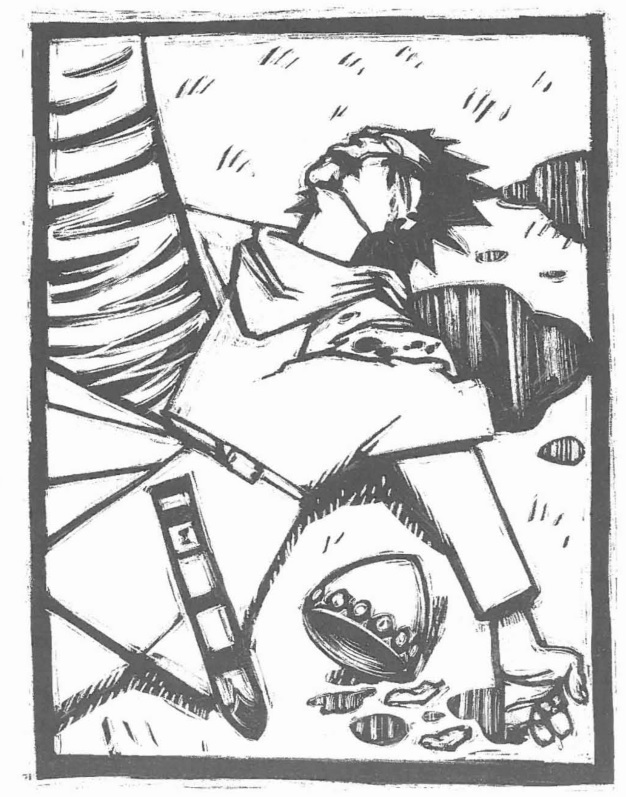
No, it's not a scratch, fucking stop referencing that already we're not British
Then it's time for the Damage Tables! Once we know how bad the wound is and where it landed, we reference these to learn what exactly happened. Take a Severe Slashing wound to the neck? Great bleeding, death in five minutes if it isn't stopped. Take a Grave Wound to the underbelly? "Loss of virility" and gangrene
 And it's entirely possible to take a Piercing blow to the urethra
And it's entirely possible to take a Piercing blow to the urethra


 The tables are even more painful to read than the WFRP ones, so you really want to invest in armor or not getting hit. After a couple of handy tables that summarize the combat procedure and all the Combat Techniques (including which weapons can deal which blows, minimum Strength and Dexterity, range, etc.) we are introduced to the
Armor
tables. Armor pieces are, aside from its weight and initiative modifier, further defined by their resistance to individual damage types, location and
layer
: it is possible for PCs to wear, for instance, a woolen cap and a leather or iron helm on top of it. There are common armor sets for Almogaver infantry and cavalry, as well as those of their foes, and a single generic armor score for NPCs because who the fuck cares to track individual armor pieces for every two-bit mook.
The tables are even more painful to read than the WFRP ones, so you really want to invest in armor or not getting hit. After a couple of handy tables that summarize the combat procedure and all the Combat Techniques (including which weapons can deal which blows, minimum Strength and Dexterity, range, etc.) we are introduced to the
Armor
tables. Armor pieces are, aside from its weight and initiative modifier, further defined by their resistance to individual damage types, location and
layer
: it is possible for PCs to wear, for instance, a woolen cap and a leather or iron helm on top of it. There are common armor sets for Almogaver infantry and cavalry, as well as those of their foes, and a single generic armor score for NPCs because who the fuck cares to track individual armor pieces for every two-bit mook.
Recovery! Bleeding is stopped by a First Aid roll. If the wound requires surgery as indicated in the damage tables, then the First Aid roll can only reduce great bleeding to regular bleeding, and the patient has to survive the 30 minutes the surgery requires (Medicine roll, can be hastened by increasing difficulty). Then, the wound must be treated, and can become infected depending on local conditions (hint: don't go dumpster diving with a sucking chest wound). Once the wound is treated, the character recovers 1 Blood Point per hour. As they heal, wounds are treated as diseases , which have a Potency that is rolled against the character's Constitution once a day (or more, in the case of poisons). If the Potency wins, the character loses one or more fatigue rank as described in the Blood Point table. If Constitution wins, the Potency is reduced in one or more points. This ends when the Potency is gone or the character is dead. This chapter ends with a description of common diseases, illnesses, and poisons.
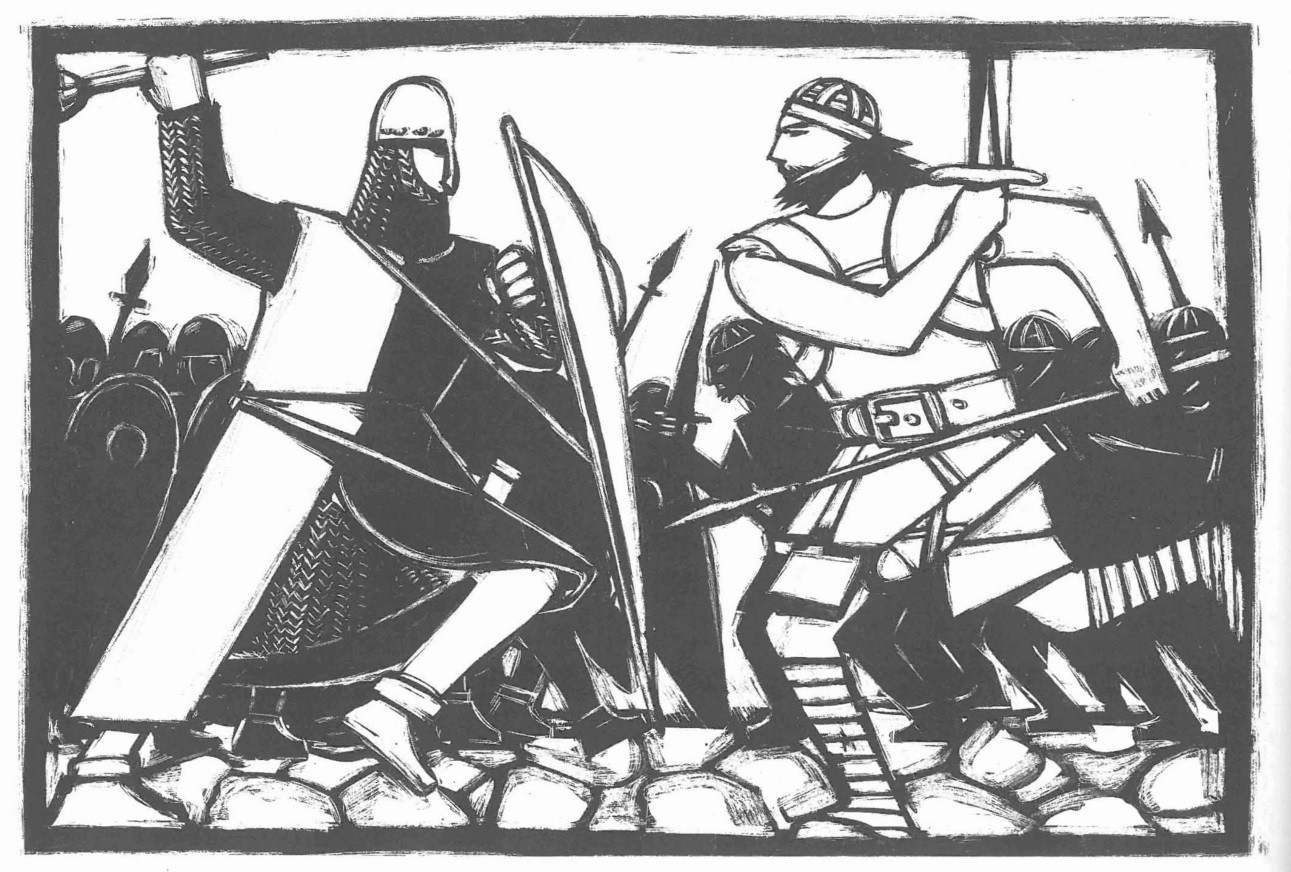
For God! For Aragon! For not taking hits to the urethra!
Next:

Suddenly, magic
Original SA post AlmogaversSuddenly, magic
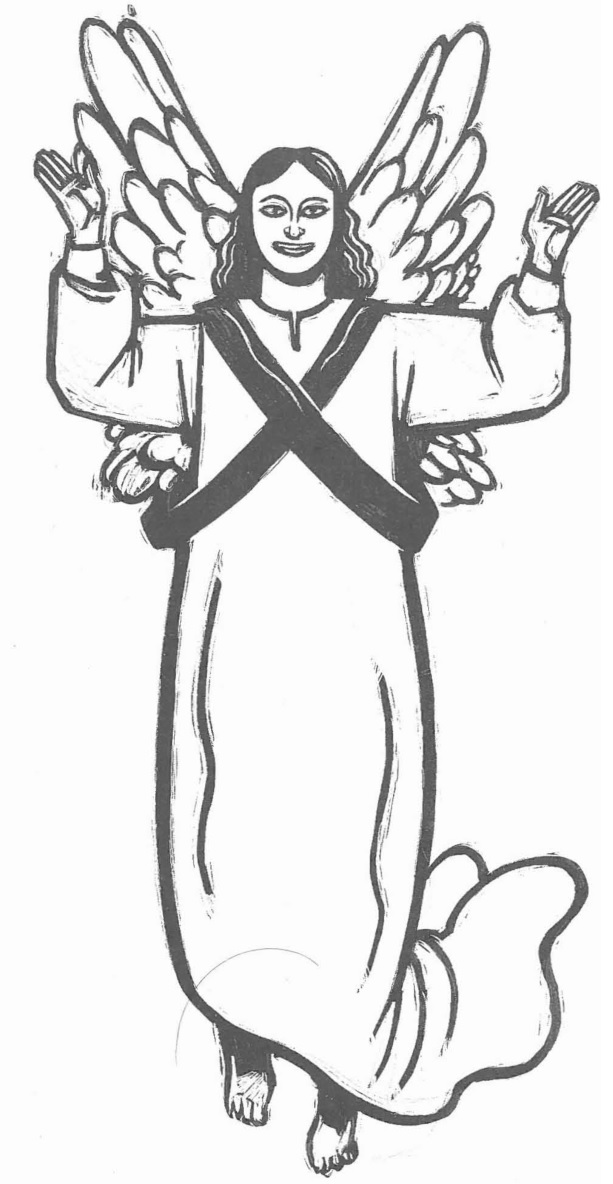
sup guys
So far Almogavers has been a detailed, purely historical game, without any more fantasy than "hey, let's play badass Catalan warriors in the ass end of nowhere kicking ass and taking names." Well, so much for that! There's a Magic and Alchemy chapter, and we're about to see some serious shit. Magic in this game is the province of initiates brought into the mysteries by masters, and as such this chapter is GM's eyes only: characters need Magic at Initiate level at the very least to know some (and even then not all!) of the information present here.
But first, cosmology! In the beginning, the Solar System was but a cloud of dust. The only energy present during that time was cosmic energy. Through millions of years, the Sun and the planets are formed. With the creation of Earth, a new type of energy is born: elemental energy, less powerful than cosmic energy but with greater influence over the planet. Contact between these two energies and matter brought about the existence of spirits, beings of energy. Most of these spirits associated themselves with the forms developed by organic matter (living beings), while others associated with inorganic matter. As living beings evolved, they generated yet another type of energy, vital energy - the least powerful of the three energies, but the one with the most influence over life.
In the first millions of years of Earth's existence, only these three types of energy existed. Spirits were formed by vital or elemental energy, but there were no spiritual beings of cosmic energy. But then some highly evolved spirits learned to combine their own energies with cosmic power: the combination of elemental and cosmic energy brought about luminous energy, and these spirits became very powerful beings. These beings became primitive gods, almost completely unbound by matter. The spirits that combined vital and cosmic energy created dark energy, and they grew powerful as well but not as much as the gods.
The beings of light (Gods) were the most powerful in the planet, no longer bound by matter, and the only self-aware beings in the planet aside from darkness beings (who lived in the depths of the Earth and far away from them anyway) As the gods were pretty much alone, they decided to create other spiritual beings from their essence, thus making pantheons of gods and celestial choirs - which turned out for the worse as pantheons were terrible families and choirs devolved into open civil war (ref: Paradise Lost). The second solution was inducing self-awareness in the most evolved animal lifeforms. This is where Man shows up. By the time Man appeared, though, there were few gods left and mankind was breeding like rabbits comparatively. Thus, the gods developed a system to make men channel elemental and cosmic power to them, namely worship and its rituals. The remaining gods thus forestalled their own disappearance, but they later began to fight over the control of Man, and so the first wars began.
As a result of internal conflict in the celestial choirs of the One God, a group of beings were cast out from His realm and thrown into the depths of the Earth along with the darkness beings. Furthermore, they were blocked from feeding on elemental energy as part of the expulsion. The leader of this group, however, learned how to feed from vital energy (perhaps taught by the darkness beings). And that would be the end of it, except that these guys also know how to use Man to channel vital energy to them through bloody ritual sacrifice. These beings become demons, with their leader being none other than Ol' Nick himself: Satan. So the conflict between the gods and the demons began, ones profiting from Man, the others feeding upon him. And then demons figured out pacts with the devil and the sale of souls...
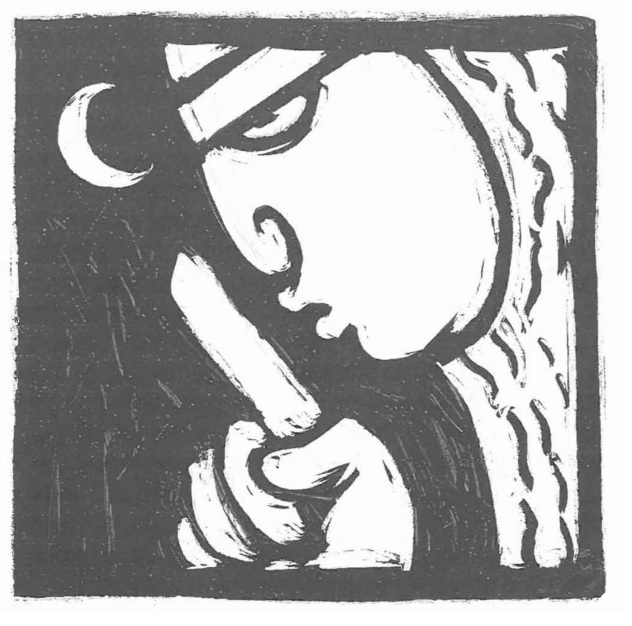
Shhh!
A description of the types of energy follows.
 Cosmic energy
is the energy that comes from space, the stars, planets and such. It is the most powerful type of energy: in a 1-10 scale, it is a 10 in space and an 8 in Earth. It is raw, alien power, without feelings or thoughts. There are no beings associated to cosmic energy in Earth but there are in space: only the weakest cosmic beings can be summoned, because the great cosmic entities are so powerful and terrible that gods, demons and darkness beings will do everything they can so that they're not summoned. If somehow one of these entities were to be summoned, it would suck all the energy from the area, killing all living beings around it. It
might
spare the caster and even reward them if they somehow manage to hold on to their sanity (Very Hard Willpower roll). Cosmic beings are pitiless but highly intelligent, and ruled by pure logic. Magic associated with cosmic energy is obviously called
cosmic magic
, the most logical and disciplined form of it, and magic circles associated to it are qabbalists, alchemists, the Egyptian school and the Pythagoreans.
Cosmic energy
is the energy that comes from space, the stars, planets and such. It is the most powerful type of energy: in a 1-10 scale, it is a 10 in space and an 8 in Earth. It is raw, alien power, without feelings or thoughts. There are no beings associated to cosmic energy in Earth but there are in space: only the weakest cosmic beings can be summoned, because the great cosmic entities are so powerful and terrible that gods, demons and darkness beings will do everything they can so that they're not summoned. If somehow one of these entities were to be summoned, it would suck all the energy from the area, killing all living beings around it. It
might
spare the caster and even reward them if they somehow manage to hold on to their sanity (Very Hard Willpower roll). Cosmic beings are pitiless but highly intelligent, and ruled by pure logic. Magic associated with cosmic energy is obviously called
cosmic magic
, the most logical and disciplined form of it, and magic circles associated to it are qabbalists, alchemists, the Egyptian school and the Pythagoreans.
 Elemental energy
comes from earth, mountains, forests, jungles, sea, and so on. It's a 6 in the power scale. Unlike cosmic energy, it does have feelings, dominated by ideas of immensity, harmony, serenity and violence. Elemental beings are known as (duh) elementals, and those closer to matter are known as
faeries
, which cannot be summoned as they lack enough entity for it. However, as elemental energy is very stable, its spirits can live for a very long time, though they will never get even close to a god's power.
Elemental magic
is used by mages close to nature to reinforce the land and the spirits bound to it. They use elementals as allies and they respect the faeries. Druidic circles, hermits and shamans use elemental magic.
Elemental energy
comes from earth, mountains, forests, jungles, sea, and so on. It's a 6 in the power scale. Unlike cosmic energy, it does have feelings, dominated by ideas of immensity, harmony, serenity and violence. Elemental beings are known as (duh) elementals, and those closer to matter are known as
faeries
, which cannot be summoned as they lack enough entity for it. However, as elemental energy is very stable, its spirits can live for a very long time, though they will never get even close to a god's power.
Elemental magic
is used by mages close to nature to reinforce the land and the spirits bound to it. They use elementals as allies and they respect the faeries. Druidic circles, hermits and shamans use elemental magic.
 Vital energy
is the closest to man: in fact, human souls are made of vital energy. It is the force of change, transformation and evolution. Only a 2 in the power scale though
Vital energy
is the closest to man: in fact, human souls are made of vital energy. It is the force of change, transformation and evolution. Only a 2 in the power scale though
 Magical creatures related to vital energy are dragons, minotaurs, sea wyrms and many other mythical or legendary monsters. They're physically very powerful, but cannot be summoned as they are too bound to matter for it.
Vital magic
is the province of mages related to blood sacrifice and the use of the human mind and body: examples are Greek mystery cults, witch covens, and the cult of Mithra.
Magical creatures related to vital energy are dragons, minotaurs, sea wyrms and many other mythical or legendary monsters. They're physically very powerful, but cannot be summoned as they are too bound to matter for it.
Vital magic
is the province of mages related to blood sacrifice and the use of the human mind and body: examples are Greek mystery cults, witch covens, and the cult of Mithra.
 Luminous energy
is the energy that forms gods and lets them work their great wills. It's a 7 in the power scale. This is the energy of faith, great convictions, order, hierarchy and obedience. It is used in sacred rituals and it's the most powerful type of energy in Earth short of cosmic power. Its associated beings are, obviously, gods and angels.
Divine magic
is used by priests of pagan religions or prophets, monks and people in "contact with God". Formal master-student teaching is more common in pagan religions, while others just get their instructions directly from the Big Sky Wizard. Related magic circles are the Order of the Great Meteor, the Guardians of the Grail, wandering monks and enlightened hermits.
Luminous energy
is the energy that forms gods and lets them work their great wills. It's a 7 in the power scale. This is the energy of faith, great convictions, order, hierarchy and obedience. It is used in sacred rituals and it's the most powerful type of energy in Earth short of cosmic power. Its associated beings are, obviously, gods and angels.
Divine magic
is used by priests of pagan religions or prophets, monks and people in "contact with God". Formal master-student teaching is more common in pagan religions, while others just get their instructions directly from the Big Sky Wizard. Related magic circles are the Order of the Great Meteor, the Guardians of the Grail, wandering monks and enlightened hermits.
 Darkness energy
is the energy of darkness beings and the demons cast out of the One God's realm. It's a 5 in the power scale. It is the energy of silence, chaos, freedom and disobedience. It's used in demonic rituals, and while powerful it's not as powerful as divine power. Its associated beings are darkness beings (a rare sight), demons and hellspawn. The latter are particularly interested in humans, as they can use pacts and sacrifice to gain vital energy.
Black magic
is used by devil-worshiping Satanic sects. They are the largest magic circles, as black magic is "easier" than the other magic types. There are no corresponding cults to darkness beings, however (they might have existed in a very remote past). Examples are Satan worshipers, priests of Baal and witches and warlocks corrupted by evil.
Darkness energy
is the energy of darkness beings and the demons cast out of the One God's realm. It's a 5 in the power scale. It is the energy of silence, chaos, freedom and disobedience. It's used in demonic rituals, and while powerful it's not as powerful as divine power. Its associated beings are darkness beings (a rare sight), demons and hellspawn. The latter are particularly interested in humans, as they can use pacts and sacrifice to gain vital energy.
Black magic
is used by devil-worshiping Satanic sects. They are the largest magic circles, as black magic is "easier" than the other magic types. There are no corresponding cults to darkness beings, however (they might have existed in a very remote past). Examples are Satan worshipers, priests of Baal and witches and warlocks corrupted by evil.
Rules! Magic is conducted through rituals and powers. Rituals are magic working, usually taking a great deal of time to work, while powers are innate gifts of a character obtained through ritual. Rituals need a number of magic points , which are gathered through components ; and spirit points , the (normally) vital energy from the mage's own spirit (Charisma). A ritual usually needs 3-5 magic points to work, as well as a minimum level of Magic knowledge. devoid of people. If a ritual requires elemental or vital magic points, cosmic magic points can be substituted by them as long as a single elemental or vital magic point is used in the ritual. If the mage doesn't have components stocked for the ritual, they must source them: depending on the type of magic involved it will take a different amount of time to obtain components for a single magic point, for instance components for an elemental magic point will take 1d6 weeks to gather in a purely natural environment, or 3d6 weeks in a city. Components can also be stocked beforehand or outright bought, but it will take an adventure to do so. They usually expire in a year, though certain rituals can start before components are obtained if they take years of casting. The ritual binds a certain number of spirit points from the mage, that can't be used again until the ritual's effect is gone and a day passes. Only one ritual may be in the works at any given time, and any interruption ruins all progress, including magic point usage. Rituals can also be modified or enhanced through magic research, and rituals from other magic types can be "translated" by a Master mage to their own type. All rituals have extra conditions to be performed, usually belonging to a relevant magic circle.
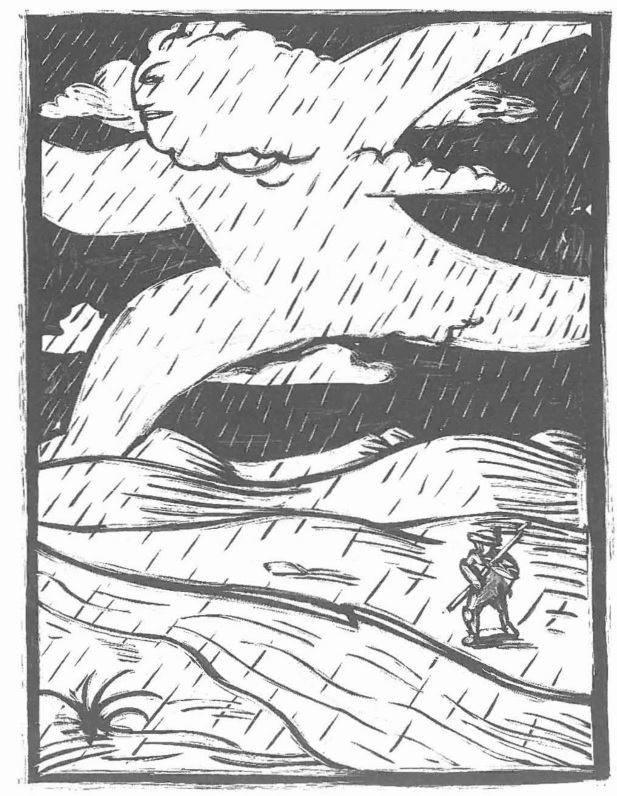
fucking dipshit wizard fucking sending me to pick up fucking herbs in fuckistan fuck fuck fuck
quote:
AUTHOR'S WARNING
ALL THE RITUALS ARE MERE PRODUCTS OF THE IMAGINATION
THEY HAVE NO REAL BASIS AT ALL
IT IS THUS LUDICROUS TO TRY PUTTING THEM INTO PRACTICE
(The Satanic panic over RPGs of the '80s is a '90s phenomenon in Spanish speaking countries - as late as the early 2000s I remember news about Spanish teenagers killing each other "trying to reenact roleplaying scenarios." Vampire: The Masquerade was particularly singled out in this regard, as evidenced by the terrible horror movie Sangre Eterna)
Cosmic magic is the most "magicky" of the magic types. You get to summon COSMIC POWAH, create magic mirrors, contact beings from outer space, create Golems (!) and even become immortal. Elemental magic lets you do all the druidy stuff like making healing herbal potions, control the weather, contact faeries, and creating the Fountain of Youth. Vital magic makes magic blood potions, summon spirits, create homunculi (special component required: fetus
 ), raise the dead and transform living beings. Pretty much all vital magic rituals can be used by black magicians as well.
Divine magic
rituals require to be in good standing with the god in addition to belonging to a relevant magic circle. Divine magicians can turn their vital essence to luminous energy, summon angels and archangels, bless stuff and straight up open portals to Paradise (!!).
Black magic
is all SATAN, usually requires human sacrifices, and lets magicians do shit like transmute their life essence to dark energy, gain demonic powers, summon demons, curse stuff and open gateways to Hell.
), raise the dead and transform living beings. Pretty much all vital magic rituals can be used by black magicians as well.
Divine magic
rituals require to be in good standing with the god in addition to belonging to a relevant magic circle. Divine magicians can turn their vital essence to luminous energy, summon angels and archangels, bless stuff and straight up open portals to Paradise (!!).
Black magic
is all SATAN, usually requires human sacrifices, and lets magicians do shit like transmute their life essence to dark energy, gain demonic powers, summon demons, curse stuff and open gateways to Hell.
Powers work in a similar way to rituals, but they take much less time and there's no dealing with magic points as they're fueled by the mage's own soul. They do use up a mage's spirit points though, but that just means those points cannot be used to work other magics until the power is gone. When channeling powers, the mage must make a Willpower roll for their soul to generate enough spirit points to fuel it, which usually involves physical exhaustion. You can end up agonizing if you summon too many powers one after the other. Many powers have different magic sources, for instance Heighten Senses can come from elemental or vital rituals. Powers in general are less :holyfuck: than rituals power-wise, but they're more useful for adventuring: telekinesis, fireballs and control over creatures are examples of things you can do with powers. Yes, there is a Lust power that only works on the opposite sex.

Increasing the Magic skill is a little more involved than raising other skills, but it's enough to say that it involves a number of initiations and the casting of the more simple rituals. Now, Alchemy is
 and making alchemical products requires a series of Alchemy rolls depending on the exact type of thing being made. Failing an Alchemy roll means blowing the whole process and being forced to start over, with the corresponding loss of ingredients, but the main obstacle for alchemists is obtaining ingredients in the first place: they're at least Infrequent, and a proper alchemist will require ready access to them and a laboratory to work their stuff.
and making alchemical products requires a series of Alchemy rolls depending on the exact type of thing being made. Failing an Alchemy roll means blowing the whole process and being forced to start over, with the corresponding loss of ingredients, but the main obstacle for alchemists is obtaining ingredients in the first place: they're at least Infrequent, and a proper alchemist will require ready access to them and a laboratory to work their stuff.
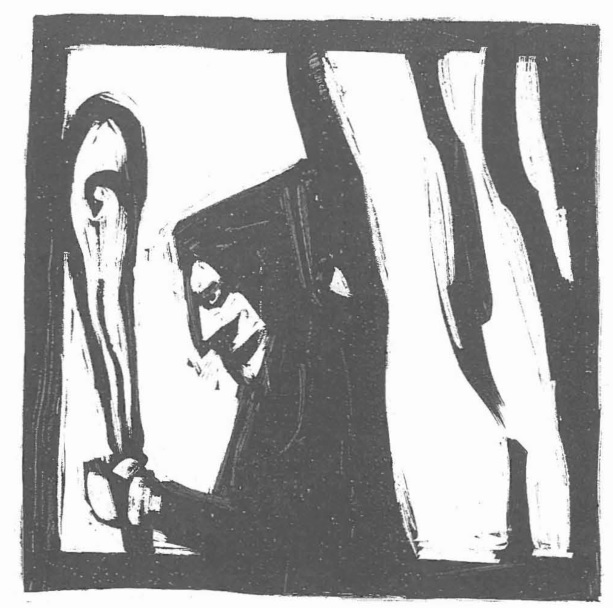
Power Word: Imminent Bonk To The Head
Next: Adventures!
Dracs i donjons
Original SA post AlmogaversDracs i donjons
It's adventure time here in Almogavers. Adventures for this game are described as first, second or third era adventures, following the descriptions from the background chapter. The sample adventures in the book are all first era, but could be adapted for the others.
The first adventure, The Tower of Wisdom , takes place after the Almogavers take Philadelphia from the Turkish. The game can actually begin during the battle itself, and the book suggests using mass warfare rules taken from somewhere or making Roger de Flor roll against the Turkish commander to play out the battle, but it seems kind of pointless as the adventure assumes no TIME PARADOXES happen and things go as they did in history. So, the adventure actually begins with the Almogavers looting the city. The PCs are actually expected to take part of the looting; the Almogavers are mercenary troops after all. They are, however, highly disciplined, and no bloodshed will be allowed (explicitly, there will be no rape and no murder, fuck you "realism" grogs). The PCs should be able to get around 10 gold pieces for their efforts. After a couple of days of rest, the PCs will be ordered by their commander to escort a wealthy Venetian trader from Philadelphia to the shores of the Aegean Sea, where a ship is waiting for him.
The merchant, Marco Talafallus , claims to be a close friend of the PC's commander (which should put the fear of God into them) and explains that the route they're meant to follow isn't too dangerous, but there may be Turkish bandits prowling around. The PCs will get 5 gold pieces each for their troubles. The journey should take around five days, with Marco riding a cart and bringing five mules loaded with goodies, and servants to tend to them. The PCs get to do the journey on foot
 The journey shouldn't be hard, but the GM may throw a Turkish ambush in the works if they feel like it. After the PCs fight off the bandits (or one day before arriving if nothing happened), Marco reveals the true goal of his journey. There is a strange
Tower
near their location, used as an university by an order of monks with friendly relations to the Order of the Great Meteor. The children of the most important families of the Byzantine Empire go to that place for learning, and studying at the Tower confers a measure of prestige. The Tower has a library with precious, rare books, and its greatest treasure is "the most important book of the Order of the Great Meteor"! The merchant has an interesting offer for the book, and he's willing to pay 100 gold pieces (200 if they push it) to the PCs if they go to the Tower and find the book. The Tower is a ziggurat-shaped building five stories high, with around twenty guards to give any robbers trouble. The PCs can try kicking the door and dealing with all of them, climbing the Tower from outside, or infiltrating it through a well outside the Tower that leads to the underground river that the Tower uses for water. There's also an electric trap and an alchemist to deal with!
The journey shouldn't be hard, but the GM may throw a Turkish ambush in the works if they feel like it. After the PCs fight off the bandits (or one day before arriving if nothing happened), Marco reveals the true goal of his journey. There is a strange
Tower
near their location, used as an university by an order of monks with friendly relations to the Order of the Great Meteor. The children of the most important families of the Byzantine Empire go to that place for learning, and studying at the Tower confers a measure of prestige. The Tower has a library with precious, rare books, and its greatest treasure is "the most important book of the Order of the Great Meteor"! The merchant has an interesting offer for the book, and he's willing to pay 100 gold pieces (200 if they push it) to the PCs if they go to the Tower and find the book. The Tower is a ziggurat-shaped building five stories high, with around twenty guards to give any robbers trouble. The PCs can try kicking the door and dealing with all of them, climbing the Tower from outside, or infiltrating it through a well outside the Tower that leads to the underground river that the Tower uses for water. There's also an electric trap and an alchemist to deal with!
 There's some fancy loot in the library, including the book they're searching for and a load of treatises on all skills, alchemy and magic grimoires, but when the PCs return to where they were supposed to meet with Marco they'll find the merchant dead: the crew of the ship that was waiting for him decided to keep his goods for themselves. A note near his body mentions the offer for the book (1000 gold pieces) and a place:
Frangokastello.
There's some fancy loot in the library, including the book they're searching for and a load of treatises on all skills, alchemy and magic grimoires, but when the PCs return to where they were supposed to meet with Marco they'll find the merchant dead: the crew of the ship that was waiting for him decided to keep his goods for themselves. A note near his body mentions the offer for the book (1000 gold pieces) and a place:
Frangokastello.
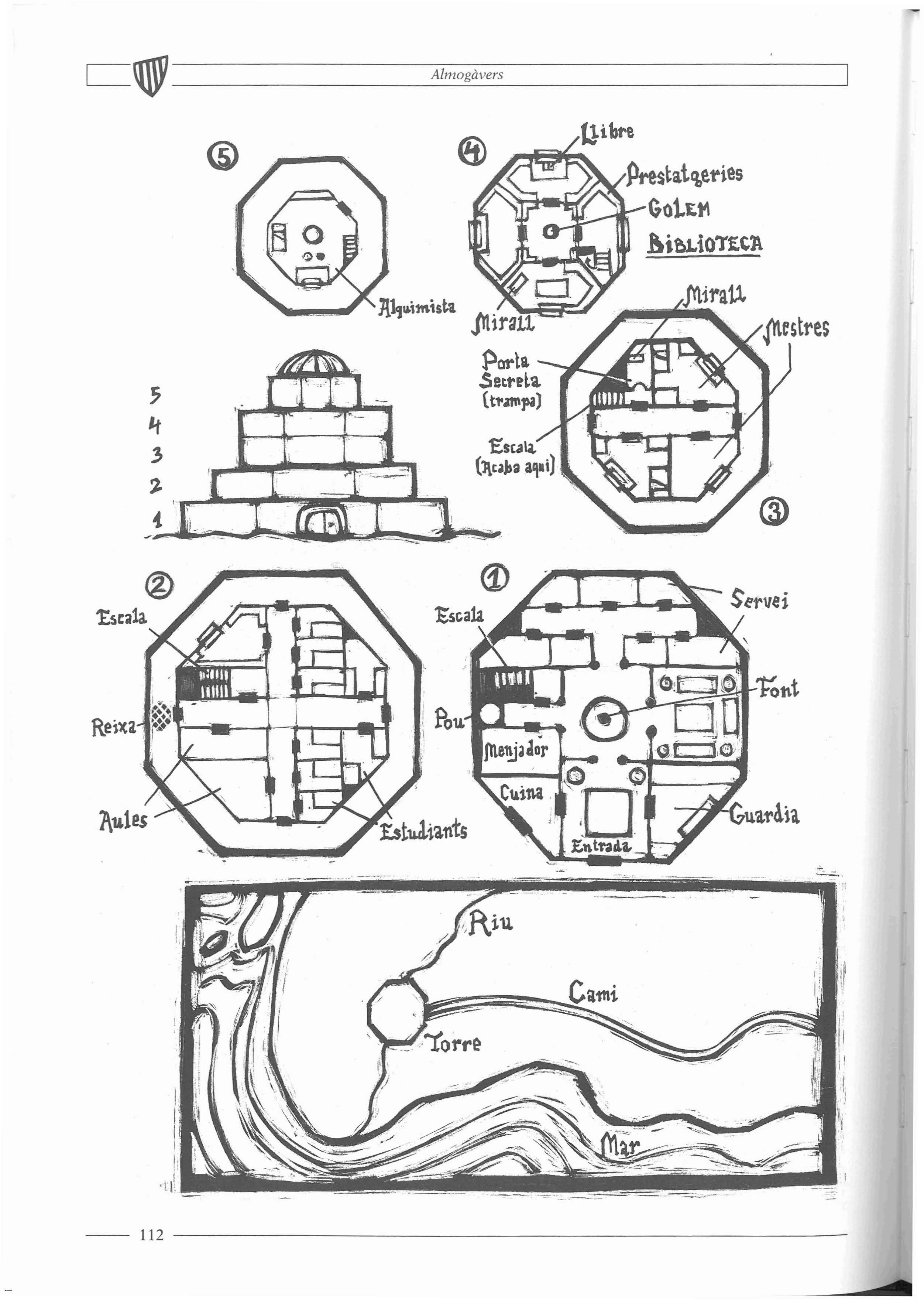
Tower of Druaga it ain't.
The second adventure, The Donjon , takes place in the isle of Crete, currently Venetian domain. The PCs try to figure out how to rejoin the Company while they stay at a local inn run by Callos de Malveure, a former adventurer that traded his sword for an innkeeper's apron a long time ago. While the PCs drink and eat, a group of Alans mercenaries not particularly friendly to Almogavers will start making a ruckus and throwing insults their way: if the players forget they're headstrong Catalan mercenaries that take no shit from no two-bit mercs, the Alans will jump them. They're more than the PCs by one man, but as soon as one of them dies or takes a Severe injury they'll flee the inn. As the PCs try to calm down the innkeeper, a mysterious stranger will walk into the inn, with a heavy bag of gold and a knife at the hilt. The stranger will search around then ask the innkeeper in Italian about the mercenaries he was supposed to meet: the innkeeper will explain, and the stranger will then ask the PCs if they care to join him for one round of drinks. Prosper the Norman merchant speaks Greek with a heavy French accent, and he says he was supposed to hire the Alans for "a little job with nothing to lose and a lot to win." A day and a half from Frangokastello there is a guard tower (which he calls "donjon" using the Frankish term) long time bereft of soldiers. Only an old man and his servant live there. Some time ago, Prosper came upon an old scroll that claimed that the treasure of Belisarius , the greatest general of Byzantine Emperor Justinian, is there. The job is simple: go to the "donjon", eliminate or force the tower's denizens to flee, take the treasure and return. He's willing to pay half of the treasure's value in gold, and he'll give the PCs a minimum amount of money for supplies. Too easy? If the PCs ask around in town, they'll learn that the old man of the tower is rumored to be a powerful sorcerer, and that aside from his hunchbacked servant there is an evil, ferocious creature, covered in thick black fur. None of the locals would even sleep near the tower for all the gold in the world. If the PCs still go, they'll find the "donjon" to be ruined and seemly uninhabited, but it's still an imposing sight. If they stay and watch it for one night, they'll hear a terrible scream, like that of one of Hell's own damned...
The truth is less spooky, though. The old man was Ezanah , a wise Ethiopian vital mage that had to leave his empire's capital due to politics. As a Christian, he took shelter in Crete rather than Muslim lands. His general lack of social life, his creepy servant and the gorilla that he brought from Africa as a baby gave the tower an aura of mystery and legend that suited him just fine, as he wanted to be left alone to his studies. He even enhanced the mystery by barring the tower's gate and making his servant use an underground passage to go in and out so that people thought he could walk through walls
 and letting the gorilla run loose from time to time. But Ezanah was dying of old age, and not all his magic could help him - which is why he needed the last vital magic ritual, Change Bodies, which coincidentally is the one the PCs stole from the Tower of Wisdom. Ezanah died before he could get his hands on the book, and the grief-stricken gorilla killed the servant in a fit when he tried to bury his master's body. The donjon is spooky, but the greatest difficulty the PCs will have is actually getting inside, navigating the ruins, and then dealing with the poor gorilla that will defend its master's body to the death. Aside from his library (again, the loot is treatises and stuff) the PCs will find Ezanah's
diary
in Greek, and they'll realize Belisarius' "treasure" is nothing but
Saint Bartholomew's wooden bowl
, given to him by Justinian. The bowl is magic (7 luminous magic points for the Dispel Magic power) and could be of interest for philosophers or sages, but not for rough mercenary types like the PCs, and certainly not for Prosper - who will be convinced the PCs tried to keep the real treasure for themselves.
and letting the gorilla run loose from time to time. But Ezanah was dying of old age, and not all his magic could help him - which is why he needed the last vital magic ritual, Change Bodies, which coincidentally is the one the PCs stole from the Tower of Wisdom. Ezanah died before he could get his hands on the book, and the grief-stricken gorilla killed the servant in a fit when he tried to bury his master's body. The donjon is spooky, but the greatest difficulty the PCs will have is actually getting inside, navigating the ruins, and then dealing with the poor gorilla that will defend its master's body to the death. Aside from his library (again, the loot is treatises and stuff) the PCs will find Ezanah's
diary
in Greek, and they'll realize Belisarius' "treasure" is nothing but
Saint Bartholomew's wooden bowl
, given to him by Justinian. The bowl is magic (7 luminous magic points for the Dispel Magic power) and could be of interest for philosophers or sages, but not for rough mercenary types like the PCs, and certainly not for Prosper - who will be convinced the PCs tried to keep the real treasure for themselves.
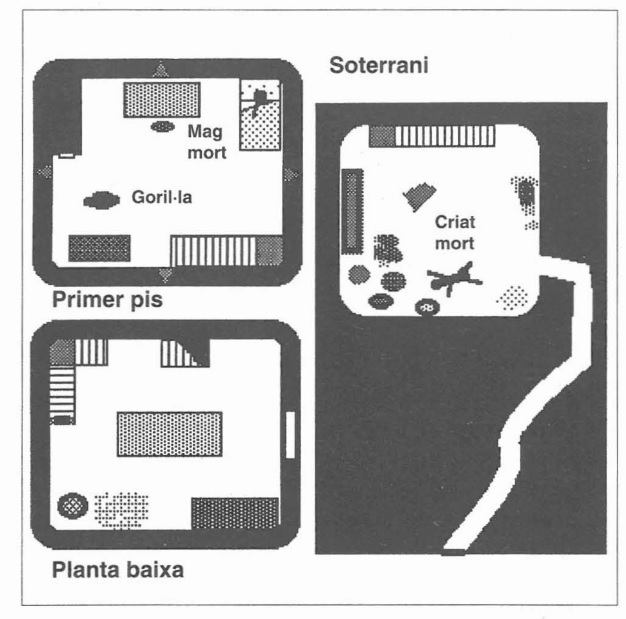
Temple of Elemental Evil it ain't.
The third adventure, Beyond the Sea , is actually meant for one or two characters and can take place in all eras, but it can be run as a continuation of The Donjon. The PC(s) are aboard the Santa Caterina , a Catalan merchant ship on a trip to Constantinople. Its captain, Aleix "The Crow" Ginesta is a seasoned sea wolf, but as he has never navigated the eastern Mediterranean the trip is considered "risky" by Catalan bankers. The Santa Caterina will make several stops, and just as it leaves Candia (modern Heraklion) in Crete ends up in the sights of a Genoese galley , all too willing to jump a slow Catalan cog. Captain Aleix knows he can't let the ship get captured, so he does everything he can to flee the Genoese (jettisoning cargo, full sail, finally pointing at the island of Karpathos ) trying to make the chase last until night. The Genoese draw closer and closer and the sailors are freaking out, but fortunately the Genoese lose time trying to recover the jettisoned cargo. Note that so far the PCs get to do nothing in this longass cutscene. Finally night falls, and since night sailing is pretty much asking for trouble the Genoese captain settles for the cargo the Catalan cog lost and lets them flee. The ship sets sail to Olympos, but alas! The island they're close to is not Karpathos, but Rhodes . Not that anyone on the ship knows about it!
The ship unfortunately crashes against rocks by the shore and starts sinking quickly: it's now up to the PCs to find something to hold on to and fight off the maddened sailors as it's Everyone For Himself O'Clock. Three Swimming checks (PCs do know how to swim, right?) will take them to the nearest shore: Rhodes. Once the PCs figure out where they actually are, they should try making their way to the city of Rhodes, where there are consuls from all the major trading powers, Catalonia included. But to get there, they must pass through the village of Kastellos . The people of the village use to loot all the ships that end up wrecked near them, and they will kill or finish off any survivors they find. They're not too interested in letting anyone get to Rhodes, as that will bring about law enforcement and some awkward questions about the things they have looted from the wrecks. It's up to the PCs to fight their way through or flee and hide, but their gear will be at the bottom of the sea most likely
 Eventually the PCs will come across a
small cave
where they can lose their pursuers, but because this adventure is not assholish enough yet it will lead them to a
nest of vipers
over half a meter long each. Should the PCs manage not to get bitten to death and take out the vipers (silently-ish!) they'll come across
an old wall
that, when taken down, reveals treasure! Perhaps icons from the
Monastery of Atramitis
, not far from their location; or a trio of scrolls that, when translated from Greek, reveal the journey of a ship to three mysterious islands that we would later know as
the Azores
, not "officially" discovered until 1432. It's up to the GM to decide what the PCs will find behind the wall, depending on their proclivities. Finally, the PCs will be able to get to Rhodes and ask for help: before 1309, the corrupt Byzantine administration will care little for them, but after 1309 the island will be under the Hospitallers and they'll be quick to help the PCs. Either way, the authorities will send men to Kastellos to deal with the looted cargo and, in the case of the Hospitallers, arrest some of the villagers for murder. Anyway, fuck this adventure.
Eventually the PCs will come across a
small cave
where they can lose their pursuers, but because this adventure is not assholish enough yet it will lead them to a
nest of vipers
over half a meter long each. Should the PCs manage not to get bitten to death and take out the vipers (silently-ish!) they'll come across
an old wall
that, when taken down, reveals treasure! Perhaps icons from the
Monastery of Atramitis
, not far from their location; or a trio of scrolls that, when translated from Greek, reveal the journey of a ship to three mysterious islands that we would later know as
the Azores
, not "officially" discovered until 1432. It's up to the GM to decide what the PCs will find behind the wall, depending on their proclivities. Finally, the PCs will be able to get to Rhodes and ask for help: before 1309, the corrupt Byzantine administration will care little for them, but after 1309 the island will be under the Hospitallers and they'll be quick to help the PCs. Either way, the authorities will send men to Kastellos to deal with the looted cargo and, in the case of the Hospitallers, arrest some of the villagers for murder. Anyway, fuck this adventure.
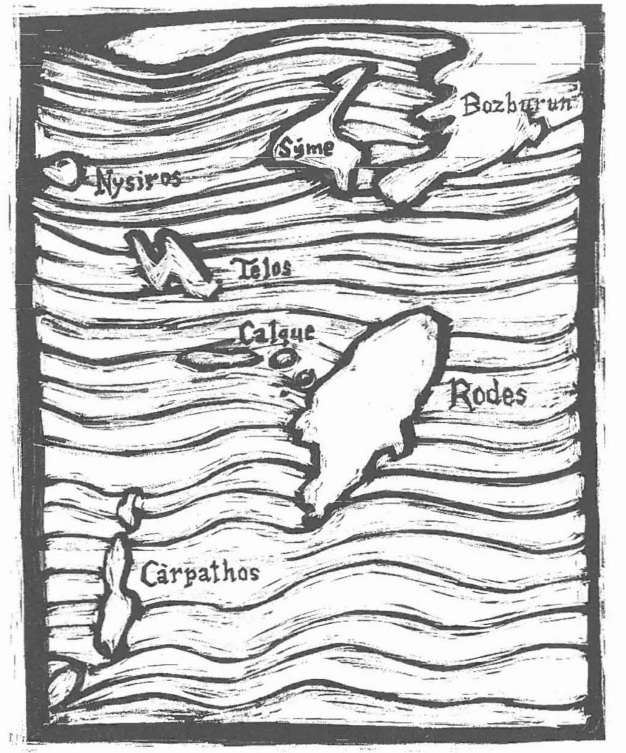
Shadow of the Colossus it ain't.
The last adventure, A Cry In The Night , is first era only. The Emperor and part of his court have gone to Bursa for their hot spring baths, leaving in Constantinople just the Pinkerne (royal steward), the Megadomestikos (commander in chief of the garrisons) and other lesser functionaries. And strangely enough, the Emperor's own son and co-Emperor, Michael , returned to Constantinople soon after leaving with the Emperor. He's actually setting up the final touches for a cunning plot against the Emperor, gathering loyal cronies and troops to take over the city and proclaim himself the sole Emperor of Byzantium. All that is left is persuading or eliminating the Pinkerne, the Megadomestikos and the Patriarch of Sophia. For whatever reason, the PCs are hanging around the Valente aqueduct late into the night. Taking a turn, they'll come across a woman , wearing little more than a cloak around her body. A Perception check will tell them she's scared to hell and, if they don't show hostility, she'll beg them for their help once she notices they're fighters. Sobbing, she'll tell them she was at her lover's house when they heard noises in the first floor. He made her escape through a ladder and went to check: once she heard sounds of fighting, she fled the scene. She won't answer anything about her identity or that of her lover though. The fighting seems to be over by the time the PCs get there, but they'll find a man bleeding to death in the bedroom. With his waifu crying over him, the man (Anastasi) will beg the PCs to "save... the... Megadomesti..." and then he'll dramatically die... unless the PCs can roll some First Aid, in which case he can tell them he is Anastasi Fieromonte, Pinkerne to the Emperor, and they are to warn Megadomestikos Emili Porrano at the Fortress of Seven Towers . The PCs will have to hustle!
As they make their way through the city, they might notice there are no night patrols, which should tip them off that shenanigans are afoot. When they get to the Fortress, they'll hear fighting from one of the alleys near it, with one man in Imperial garb fighting off four hooded goons. That's the Megadomestikos, and he'll identify himself as such if the PCs don't take the hint. The PCs should have little trouble dispatching the assassins, but they'll find nothing on their bodies. They will be able to tell they're military sorts (and wearing guard weaponry to boot); if one of them survives, he will say little of importance: they only know the names of some officers they know from secret meetings. All that these goons know is that they had to kill the Megadomestikos, but they assume whoever is running the show must be someone very important. Emili will demand that the PCs follow him into the Fortress, where the guard (loyal to him) will recognize him and have a surgeon brought to him. If the PCs tell him the whole story, he'll put two and two together and tell them he thinks there's a plot to remove the Emperor from office. If one of the killers was interrogated, he'll have the troops near the fortress swear again the oath of fealty to the Emperor, and he'll have Megadux Roger de Flor summoned to get extra hands against the plot. The Almogavers will be tasked with replacing the city guard and arresting the known conspirators. Roger will congratulate the PCs in person for their efforts and order them to guard the Hagia Sofia, where nothing bad is expected to happen. They get there without any incident, but while they're informing the Patriarch of the current events a number of armed men burst into the temple - followed by some of the "loyal" troops that came with the PCs! The leader of the rebels is the Domestikos (commander) of the city wall, and if the PCs win he will flee for the palace. A chase begins through the city, but the GM is expected to let the Domestikos reach the palace with the PCs hounding his steps... only to find him dead at the hands of Michael himself. He will claim he had to kill him in self-defense: a Perception check will reveal he's lying but hey, it's the word of the freaking co-Emperor himself. Once the Emperor returns, the subsequent investigation will reveal the Domestikos was the sole ringleader
 . As for the PCs, they will receive public thanks from the Emperor, and they will be offered the position of city guards if they so wish.
. As for the PCs, they will receive public thanks from the Emperor, and they will be offered the position of city guards if they so wish.
And, with a bestiary of creatures mundane and magical and a list of generic NPCs, that's the end of Almogavers!
